THE HEARTS & MINDS VERY BEST AND PERSONAL FAVORITES of 2021 – PART TWO
Well, here we go again, more lists of some of our favorite reads of last year. Hope you saw my little meditation on our state of the art here in D-town. And that first great list.
Again: much of what we share here as “the very best” is subjective and colored by my own memory of what I read a half a year ago, conversations that helped us realize how certain books struck people, and, I suppose, what people we respect thought about certain titles. And, of course, there is the question of for whom a book may be “best.” One size doesn’t fit all. I’ve got some unique tastes and interests, I suppose. We’re glad you want to consider these and we’d be very pleased to send some soon.
Please order by using the secure order form page at our bookstore website by clicking on the “ORDER HERE” tab at the very end of this column. Thanks!
THE ARTS & LITERATURE
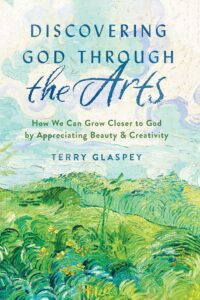 Discovering God Through the Arts: How We Can Grow Closer to God by Appreciating Beauty & Creativity Terry Glaspey (Moody Press) $16.99 OUR SALE PRICE = $13.59
Discovering God Through the Arts: How We Can Grow Closer to God by Appreciating Beauty & Creativity Terry Glaspey (Moody Press) $16.99 OUR SALE PRICE = $13.59
We have carried all of Terry’s many books and have been proud of his good, good work. We rejoiced when his 50 Masterpieces Every Christian Should Know was picked up and re-issued in paperback by Moody Press ($24.99.) Good call!
And thanks to Moody Press for doing this one early this past year, and doing it so nicely (at a great price, too!) There’s lots of full color art, lots of examples of the sorts of stuff he writes about, chapter by chapter. We reviewed this at BookNotes and I’m proud to have my name on the inside as an early rave endorser. What a joy.
And, yep, others have awarded this as a Best Book of 2021, so the word is getting out. Discovering God Through the Arts is useful as a tool for ordinary folks wanting to deepen their discipleship, it is good for those who need sort of a “spiritual” excuse to appreciate classic and contemporary art, it is a blessing for those who intuit the implications of art appreciation but just have never studied all the ways in which artfulness can help us. From learning to contemplate to understanding the Bible better, from nourishing our imaginations to cultivating empathy, art can help us become more of what God wants people made in his image to be. More urgently, attentiveness to creativity and the arts can help followers of Jesus take up their cross and follow Him. I think this is one of the best books of spiritual formation and radical discipleship, even though it gets there gently and with great grace. Surely CT and others are right: Discovering God Through the Arts: How We Can Grow Closer to God by Appreciating Beauty & Creativity is surely one of the Best Christian Books of 2021.
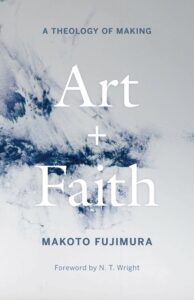 Art and Faith: A Theology of Making Makoto Fujimura (Yale University Press) $26.00 OUR SALE PRICE = $20.80
Art and Faith: A Theology of Making Makoto Fujimura (Yale University Press) $26.00 OUR SALE PRICE = $20.80
I announced this when it first came out, and named it again in a long BookNotes list of books about aesthetics and the arts that we did after the fall CIVA conference. Naturally, this is one of the key books in this whole movement of Christians in the visual arts and we, along with many others from across the social and theological spectrum, esteem Mr. Fujimura for this egregiously good abstract art and for his fine, thoughtful prose. That N.T. Wright wrote a good forward to this Yale University Press hardback might illustrate not only its solid theological orientation but its world class prominence.
This “theology of making” is one of the important books in this genre and we are very happy to honor it here again at Hearts & Minds.
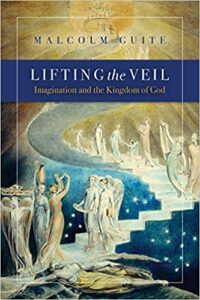 Lifting the Veil: Imagination and the Kingdom of God Malcom Guite (Square Halo Books) $18.99 OUR SALE PRICE= $15.19
Lifting the Veil: Imagination and the Kingdom of God Malcom Guite (Square Halo Books) $18.99 OUR SALE PRICE= $15.19
Did you see our explanation of this (in the aforementioned long BookNotes art book list?) Square Halo is a boutique publishing house run by our dear pals Ned & Lesley Bustard and Allan & Diana Bauer. We stock everything they do — including several good new books this season. This, though, is a coup; Malcolm Guite is an internationally esteemed poet, priest, liturgist, writer, and theologian (see his brand new little book in the “My Theology” series from Fortress called The Word Within the Words.) Guite speaks on several continents and is well loved among many from various theological spaces.
Lifting the Veil includes lectures given at Regent College in Vancouver and is enhanced with artwork and etchings, graphics and nice design. Square Halo does this sort of thing quite well and it makes this little book even that much better — an artful book inviting us into the redeemed imagination. What a book! Congratulations to Square Halo for all their good books released in 2021; Lifting is my favorite of ‘em all.
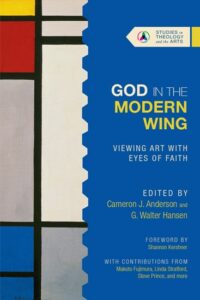 God in the Modern Wing: Viewing Art with Eyes of Faith edited by Cameron Anderson & Walter Hansen (IVP Academic) $30.00 OUR SALE PRICE = $24.00
God in the Modern Wing: Viewing Art with Eyes of Faith edited by Cameron Anderson & Walter Hansen (IVP Academic) $30.00 OUR SALE PRICE = $24.00
I do not read many books about the arts, although we are interested in curating a good selection here about faith and the arts. We stock books on art and music and literature and aesthetics (and the process of developing a creative process) andwe appreciate the divergent perspectives of authors from various angles of vision. That is, we have Orthodox scholars pondering medieval art and evangelicals looking at modern art and Catholic thinkers ruminating on all manner of aesthetic theory, spiritual directors writing about pondering paintings as prayer, etc. etc.
We are partial to the wondrous writing of Calvin Seerveld (Rainbows for the Fallen World, just for starters) and so value those in his wake as many contemporary writers from across the world are. IVP has a set of books called “Studies in Theology and the Arts” and they are all excellent and I suspect each cites Seerveld at some point.
God in the Modern Wing is the latest in this ongoing “Studies in Theology and the Arts” series and it captures a bunch of lectures given a few years ago about artists whose work is displayed in the “Modern Wing” of the Art Institute of Chicago. First Presbyterian Church there, with the help of CIVA (Christians in the Visual Arts), hosted a lecture series with each lecture exploring the religious theme of an artist in the nearby museum, followed by a walk through the museum. What a rich, wonderful, faithful program, which happily became this superlative book.
I was won over by the introduction to this book explaining why the Chicago church did this program and how they pulled these nationally known scholars and artists together for the course. That they eventually put it into a book and published it through IVP Academic is a great grace and we are thrilled to celebrate it here, now.
Perhaps not everyone is generous about all this. However, even Hans Rookmaaker, the Dutch art historian who influenced Francis Schaeffer and was famously worried about the nihilistic worldview expressed in some modern art, would have loved this project; I am sure of it. God in the Modern Wing, with the blocky cover from Mondrian is the fruit of a major collaboration of several Christian groups and this good church near the Modern Wing and we are eager to honor it as one of the great books of 2021. Thanks be to God.
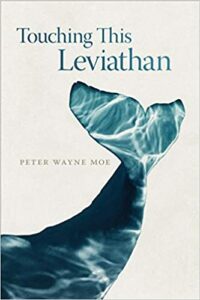 Touching This Leviathan Peter Wayne Moe (Oregon State University Press) $19.95 OUR SALE PRICE = $15.96
Touching This Leviathan Peter Wayne Moe (Oregon State University Press) $19.95 OUR SALE PRICE = $15.96
Some books just show up somehow and I am drawn to them, perhaps from an allusive title or a lovely cover. In this case, it was both — what is this even about? The description in the University Press catalogue seemed itself allusive, but I was curious enough to order it in for the shop. Was it natural history, about whales? I like whales. But I didn’t expect this:
Touching This Leviathan asks how we might come to know the unknowable — in this case, whales, animals so large yet so elusive, revealing just a sliver of back, a glimpse of a fluke, or a split-second breach before diving away.
How might we know the unknowable? I didn’t see that coming.
Here is more of how they described it:
Drawing on biology, theology, natural history, literature, and writing studies, Peter Wayne Moe offers a deep dive into the alluring and impalpable mysteries of Earth’s largest mammal.
Entertaining, thought-provoking, and swimming with intelligence and wit, Touching This Leviathan is creative nonfiction that gestures toward science and literary criticism as it invites readers into the belly of the whale.
Did he say theology? And, “the belly of the whale”? Yes; it ends up this author is biblically literate, to say the least, and has written for Image journal. He is a Christian who teaches English at Seattle Pacific University and oversees the writing program there.When I saw the good comments about it from Image editor Jamie Smith, I realized I had stumbled upon something extraordinary.
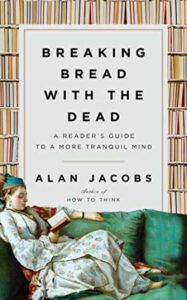 Breaking Bread with the Dead: A Reader’s Guide to a More Tranquil Mind Alan Jacobs (Penguin Books) $16.00 OUR SALE PRICE = $12.80
Breaking Bread with the Dead: A Reader’s Guide to a More Tranquil Mind Alan Jacobs (Penguin Books) $16.00 OUR SALE PRICE = $12.80
This, too, is an honorable mention for 2021 because it came out in paperback this past year. Had I done a Best of 2020, it surely would have been listed. I have more than one friend who are exquisite readers, who read seriously, widely, and a lot. They both insist it is one of the best books they’ve ever read, a magnificent and provocative experience inviting them to ponder the wisdom of ancient writers. As we said at BookNotes a while ago, I couldn’t put it down.
Reading ancient writers, Jacob’s says, allows us some freedom from the anxieties of our own age. Mature and yet clearly written, as you’d expect from professor Jacobs, one of our favorite public intellectuals and an engaging, artful writer.
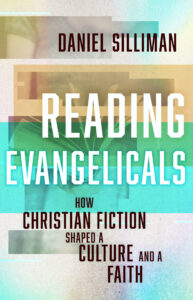 Reading Evangelicals: How Christian Fiction Shaped a Culture and a Faith Daniel SIlliman (Eerdmans) $27.99 OUR SALE PRICE = $22.39
Reading Evangelicals: How Christian Fiction Shaped a Culture and a Faith Daniel SIlliman (Eerdmans) $27.99 OUR SALE PRICE = $22.39
We announced this at BookNotes and I might have said in that early review that we are unsure where to put this volume in the shop. Is it mostly history? (Historian Mark Noll has a blurb on the back as does Kristin Kobes Du Mez.) Is it literary criticism? (Karen Swallow Prior raves.) Popular culture studies? Should we just put it with the novels it discusses?
Reading Evangelicals is a play on words, right? We can “read” evangelicals and understand their worldview and place in the culture, we can understand them, by reading and interpreting them. And, we can look at those we might call “reading evangelicals.” What Silliman is brilliantly doing here is looking at the readings habits of certain sorts of mainstream evangelicals. So he “reads” evangelicals by exploring “reading evangelicals.” Or at least certain reading evangelicals and books popularized by evangelicals, mostly. It is thrilling to anyone who follows these things and informative for those who do not.
As one who has sold — often not terribly enthusiastically — these very books, we can attest to their importance. They are often very valued by the readers (God bless them) and important for how they shaped attitudes, especially about key things in what has become known as the culture wars. For better, but mostly for worse, a handful of representative books and authors shaped and influenced a whole segment of conservative Protestants in the last half of the 20th century and how they think about the world.
In a world where I had more time, I’d convene a panel or two about this provocative book. Is he astute in selecting these particular titles? What might other cultural critics say about the impact of these authors on evangelicalism’s late 20th century ethos? Have these influences reverberated across Y2K and into the current century? Why or why not?
And what about ordinary readers of, say, Christian romance or Amish fiction or the supernatural thrillers of Frank Peretti? Did The Shack cause the current rage for faith deconstruction? Do hundreds of thousands of Left Behind fans really think that since we are going to be raptured away from this evil world we really don’t have to care about the threat of nuclear weapons or the damages of climate change? As many of these very sorts of customers we know and love, I cannot say if Silliman’s thesis is fully water-tight. But he is on to something, something big, electric, even. These books have millions of readers.
Reading Evangelicals is a very interesting book about a very interesting topic but is more than just of a passing interest; this is a matter of great consequence. It may help us understand the very tenor of our times, from evangelical support of former President Trump to the religiosity behind some anti-mask/anti-vaccination fury. I’d like to think that Eric Metaxas is self-aware enough to know that he might be subconsciously living out a Frank Peretti novel, but I have my hunches. Silliman’s book might be a key to unlocking a whole lot of mystery these days. In any case, it’s one of our favorite books about books, one that captures some of our forty years here serving dear customers in Dallastown.
Reading Evangelicals is a winsome, yet incisive study of evangelical culture and life through Christian best-selling fiction. It is a Pilgrim’s Progress for twentieth- and twenty-first-century evangelicals, decoding their fears, hopes, and dreams through Christian fiction. A worthy and essential read for anyone who wants an in-depth, compassionate look at the evangelical culture of reading. — Anthea Butler, author of White Evangelical Racism: The Politics of Morality in America
The clever double entendre of Daniel Silliman’s title is more than matched by the insights and sheer readability of the book itself. Its patient account of million-selling evangelical novels is full of unusual wisdom about the authors of these books, but also their publishers, the bookstores that sold them, and (not least) the multitudes who have read them. Silliman’s depiction of American evangelicalism as an ‘imagined community’ defined in large part by these best sellers is thought-provoking in the best way possible. — Mark Noll, author of The Scandal of the Evangelical Mind
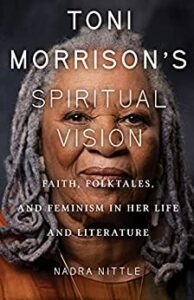 Toni Morrison’s Spiritual Vision: Faith, Folktales, and Feminism in Her Life and Literature Nadra Little (Fortress Press) $24.00 OUR SALE PRICE = $19.20
Toni Morrison’s Spiritual Vision: Faith, Folktales, and Feminism in Her Life and Literature Nadra Little (Fortress Press) $24.00 OUR SALE PRICE = $19.20
This is not the first book on the moral imagination and broader social vision of this significant black woman writer. It is, surely, the one that explores her Catholicism more adeptly and appreciatively than any other. For this, alone, we want to honor this important contribution to understanding how Christian faith influences culture, and, in this case, a world-class novelist and essayist. Nadra Nittle is herself a black Catholic writer and journalist who has written for Vox Media, Atlantic, Salon, the Guardian and the Jesuit journal, America.
Toni Morrison’s Spiritual Vision is the seminal text for anyone who wants to gain a deeper understanding of an under-appreciated yet central part of Morrison’s life and literature: her Catholic faith. — Ekemini Uwan, public theologian and cohost of Truth’s Table podcast and co-author of the forthcoming Truth’s Table: Black Women’s Musings on Life, Love, and Liberation
Nittle has written just the book we need: an engaging and thorough consideration of Toni Morrison’s religious vision. For too long Morrison’s significant spiritual influence has been unspoken or, at best, misunderstood. No more. — Nick Ripatrazone, author of Longing for an Absent God: Faith and Doubt in Great American Fiction and Wild Belief: Poets and Prophets in the Wilderness
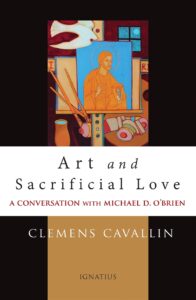 Art and Sacrificial Love: A Conversation with Michael D. O’Brien Clemens Cavallin (Ignatius Press) $14.95 OUR SALE PRICE = $11.96
Art and Sacrificial Love: A Conversation with Michael D. O’Brien Clemens Cavallin (Ignatius Press) $14.95 OUR SALE PRICE = $11.96
Oh my, I wanted to read this from the moment I saw it — an incredibly classy cover in a small but handsomely constructed paperback, and that title! Art combined with sacrificial love. Wow. Skimming it quickly I was drawn in to several pages here and there each convincing me I’d read it carefully. Not every book, not even every good book, that ends up here at the shop is one I take home. This, I think, is one I will be recommending to others, anyone drawn to love in a hurting world, and certainly to those involved in the creative process. The book is an interview with the beloved, deep, Roman Catholic novelist and painter Michael D. O’Brien.
Perhaps you know his massive Ignatius Press novel Father Elijah: An Apocalypse or his earliest Sophia House. I have a friend who reads good literature deeply and he recommends most of his stories.
This little book is a rumination, a conversation, a correspondence about things that matter to every thoughtful person, and certainly to artists trying to be faithful to God in their work.
As Joseph Pearce, literary critic and historian (and author of books on J.R.R. Tolkien) notes, “Michael O’Brien’s art is quintessentially personal, in the sense that it incarnates the extraordinary vision of this marvelous man.” Elizabeth Lev, an art historian (and author of How Catholic Art Saved the Faith) notes that, as was said of Fra Angelico, O’Brien is “living truth while waiting truth.”
O’Brien’s conversation partner and author of the book is Clemens Cavallin, a professor in History of Religions at the University of Gothenburg, Sweden and professor of Religion, Philosophies of Life, and Ethics at Nord University in Norway. He has written a bigger book on O’Brien called On the Edge of Infinity.
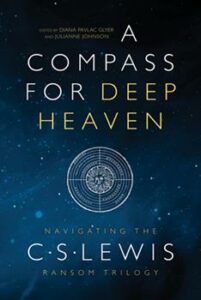 A Compass for Deep Heaven: Navigating the C. S. Lewis Ransom Trilogy edited by Diana Pavlac Glyer & Julianne Johnson (Square Halo Books) $24.99 OUR SALE PRICE = $19.99
A Compass for Deep Heaven: Navigating the C. S. Lewis Ransom Trilogy edited by Diana Pavlac Glyer & Julianne Johnson (Square Halo Books) $24.99 OUR SALE PRICE = $19.99
How could we not list this as a notable book of the past year? It is almost one of a kind; I can name on less than the fingers of one hand the books about the great trilogy popularly known as “The Space Trilogy.” There are nearly too many books on Narnia, but, my, my, why not more analysis and inspiring explication of Our of the Silence Plant, Perelandra and That Hideous Strength? Square Halo deserves a halo themselves for working to get this book out to the reading public. (And if your local bookstore doesn’t stock it, why not invite them to look at your copy and see what they think?)
Two quick things about A Compass for Deep Heaven. Firstly, there are some renowned Lewis scholars involved (you should know the name Diana Glyer, not least for her amazing Bandersnatch.)However, most are by younger scholars, some of them published here for the first time. I’m impressed.
Secondly, this book does what many attempt and few pull off: it is basic enough to intrigue the beginners, interesting enough to entertain the fans, and, yes, there is some remarkable insight that will reward even the studious scholar of the works of Saint Clive.
As the Square Halo team puts it, “these books allude to everything from H. G. Wells and the World Wars to Medieval cosmology and Arthurian Legend; there is much to be gained from an introduction to Lewis’s broad and eclectic interests. It provides the background information, historical context, and literary insight readers need to navigate the cosmos of Lewis’s science fiction.
I’m not the only one saying cheerio about this:
A Compass for Deep Heaven is a carefully-crafted and beautifully-edited
volume of ten fine essays that explore a common theme: the mythological,
philosophical, scientific, theological, ethical, and literary influences behind Lewis’s science fiction. Each chapter references and builds on the others,
offering multiple layers of critical and popular analysis. Detailed references and a good glossary provide added value. — Michael J. Christensen, author of C. S. Lewis on Scripture
FAVORITE ESSAY COLLECTIONS
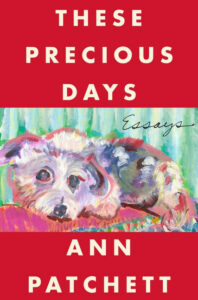 These Precious Days: Essays Ann Patchett (Harper) $26.99 OUR SALE PRICE = $21.59
These Precious Days: Essays Ann Patchett (Harper) $26.99 OUR SALE PRICE = $21.59
I suppose a collection of essays and articles by a highly regarded, highly awarded novelist and bookstore owner could be housed under, or at least near, literary criticism. This one isn’t mostly about books and writing, bookselling or poetry, but there are ample references to her writing life and how she crafts her stories. Most, though, are about her home life, her family and friendships. And dogs, There’s dogs.
I cannot tell you how much I loved these pieces — her cadence and way with sentences is remarkable. Patchett is very, very smart, and very, very accomplished, but the book never felt highbrow or pretentious or tedious — just really, really fine writing and funny, sad, interesting, inspiring tales. I was shocked by a few, blown away by a few, delighted by most. There are a lot of good pieces here about all sorts of wild stuff from her curious life, about her friend an elderly nun who serves the poor, her airplane flying, doctor husband, her rumination on book covers, her discovery of the books of Kate DiCamillo. Her dogs. Her own books. The title essay about her friendship with Tom Hanks’ assistant, Sookie, a great dresser and wonderful painter, is one I will never forget. Which is all just to say when you see this described as “essays” do not think it is like Marilyn Robinson, say, or Wendell Berry. Extraordinary talented wordsmiths that they are, I can’t imagine them doing most of the stuff Ann gets herself into. Even her sitting at table and a very serious luncheon with John Updike is told with a fan-girl goofiness that just made me grin.
Through them all, Ann is kind-hearted, down-to-earth (if more capable than most, able to do so very much) and earnestly good. I am in awe of her.
In a way this collection is maybe even more personal than the extraordinary, wonderfully written, 2013 This is the Story of a Happy Marriage, another great essay collection that we truly treasure. (There is in that one a long chapter (“The Getaway Car” which is both autobiographical about her early love for writing, but also no-nonsense (well, with a bit of wry silliness) advice about college classes, MFA programs, writing Fellowships, and doing the hard work of imagining a story and writing it down.) Both are exceedingly good, entertaining, moving. We very highly recommend both. And we certainly name These Precious Days as a favorite book of 2021.
To read this collection is to be invited into that sacred space where a writer steps out from behind the page to say Hello; let’s really get to know each other. Stoic, kindhearted, fierce, funny, brainy, Patchett’s essays honor what matters most ‘in this precarious and precious life.’ — Oprah Daily
 Thin Places: Essays From In Between Jordan Kisner (Picador) $18.00 OUR SALE PRICE = $14.40
Thin Places: Essays From In Between Jordan Kisner (Picador) $18.00 OUR SALE PRICE = $14.40
If I were giving awards last year (2020) which I sadly missed due to Covid-related business junk, I would have said (and I have said, perhaps not enough) that this was one of my favorite books of that year. I had a very nice, trim sized hardback, published by the prestigious Farrar, Straus, and Giroux. I am not as fond of the new paperback cover (blue and white) but the essays here are still luminous, profound, so very interesting, well done, heart-felt, and etcetera. The paperback came out in 2021, so it’s a Best of this year, too.
I do not know exactly why I was first drawn to this, perhaps because she was acclaimed as a good writer and a clever wordsmith and an honor storyteller. And that she was a born again Christian who had given up her faith, or at least most of it. I am always interested in how people contour their lives and find meaning in these days we are given and I am drawn to those sad stories of those who have drifted from vibrant faith. What can we learn as we listen well, as we honor, even, sadly, these people who find themselves needing to move on? What might have been different? In any case, her piece called “Jesus Raves” was captivating.
Ms Kisner, who has written for all manner of good journals (The Atlantic, The New York Times Magazine, Harper’s, the Paris Review, the Guardian) and has won a Pushcart Prize and teaches creative writing at Columbia. She is a heck of a writer in my estimation, artful, luminous at times, terrifically fun and very compelling. That a person of sincere faith ends up getting published with rave reviews from the likes of Leslie Jamison (The Empathy Exams) who says her essays are “like intricate tattoos: etched with a sharp and exacting blade of intellect, but made of flesh.”
The details are there, her ability to notice and attend to things is admirable. I think she said she is offering “encounters with the ineffable” and, as Phillip Lopate (author of Portrait Inside My Head) puts it, she is full of “risk and daring, urgency and contact.” This really is a fresh voice and her topics are intriguing and matter. Read the opening essays here to see what I mean.
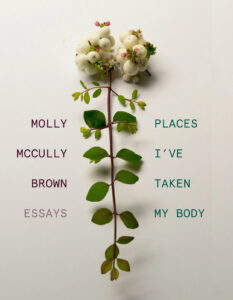 Places I’ve Taken My Body: Essays Molly McCully Brown (Persea) $24.95 OUR SALE PRICE = $19.96
Places I’ve Taken My Body: Essays Molly McCully Brown (Persea) $24.95 OUR SALE PRICE = $19.96
I was attracted to this, I’ll admit it, by the warmly appealing, clean cover, the slightly small sized, nicely made hardback. I love this book for its very design. Which is sort of introducing as this is, in fact, a collection of essays — most autobiographical, appealing to those who appreciate literary memoir — about a woman and her body. Her disabled body. It is a book that conjures places, physicality, stuff. And it is very artfully done.
Molly McCully Brown is a nationally recognized, award-winning poet of great literary substance who teaches at Kenyon College in Ohio. (She is the poetry Fellow for the prestigious Kenyon Review.) In these seventeen intimate essays, she “explores living within and beyond the limits of a body.” In her case, she has cerebral palsy (which she describes as an “often painful movement disorder.”) As she notes, in spite of her limitations, she has led a peripatetic life.(Go ahead, l look it up.)
This book is, quite often, about her travels. These are eloquent and elegant essays and exceptionally profound. She is pondering deeply (even with religious faith) the nature of her body and things that have defined her (inside and out.) She is, again, a serious scholar and literary figure so these essays — crisp and engaging — are mature and sophisticated and yet full of much tender humanity.
Perhaps you may recall a few years ago I raved about a memoir of a woman often confined to a wheelchair, a sassy and snarky and brilliant rant of a book that I adored; it was called Sitting Pretty: The View from My Ordinary Resilient Disabled Body by the very hip Rebekah Taussig. I mention this favorite and often recommended book because Places I’ve Taken is not that. It just isn’t. I would love to get these two women in a room and listen to their witty conversations, but Professor Brown is less an agitator and her beautifully crafted pieces are careful, lush, and what one reviewer called “wrenching” and another called “searing.” I don’t really mean to say she is a better writer, just a different kind of writer. There is no doubt, though, that Ms Brown is bringing a very special voice to the literature of disability.
I want to press this book into the hands of everyone I know. Writing from the locus of her own constantly changing, often intractable body, Molly McCully Brown captures the fullness of the human experience — desire, loss, flesh, faith, poetry, place, memory — with lyric compression and expansive grace. Reading these exquisite essays made me want to get out and do something with my own body — kneel at an altar and recite the Hail Mary, stub out a cigarette in Bologna, stand on a hilltop and shout expletives at the Trump administration. Which is to say, these are urgent, compelling essays that remind us how to be fully alive inside our own bodies, wherever we take them.–Jamie Quatro, author of Fire Sermon and I Want to Show You More
These remarkable essays invite us to look long and hard at our own interior landscapes, and to negotiate exterior ones with as much grace and gratitude as we can muster.— Eliza Griswold, author of Amity & Prosperity, winner of the Pulitzer Prize
DEVOTIONS & SPIRITUALITY
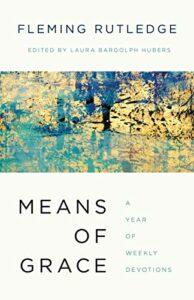 Means of Grace: A Year of Weekly Devotions Fleming Rutledge (Eerdmans) $24.99 OUR SALE PRICE = $19.99
Means of Grace: A Year of Weekly Devotions Fleming Rutledge (Eerdmans) $24.99 OUR SALE PRICE = $19.99
A wonderful collection of Rev. Rutledge’s sermons, edited to be of similar length, useful for a once-a-week devotional. Her work is very highly regarded for very good reason and we were elated when we heard they were doing a “reader” of sorts, a devotional with more than a year’s worth of her substantive, interesting, often moving sermons. Kudos to Laura Bardolph Hubers, the wonderfully thoughtful and enterprising Eerdmans employee — in marketing, actually — who did the editing, culling and trimming of the sermons from their hefty backlist of Rutledge material.
Fleming is very happy with the result of this hard work and we applaud not only Ms. Huber but the whole team at Eerdmans who produced a book that is so worth owning, a volume in a solid, handsome hardback with a striking Mako Fujimura painting on the cover. One of the best books of this sort in 2021, but, as an anthology of one of our best preachers and thinkers and writers, this may be one of the finest books of the decade!
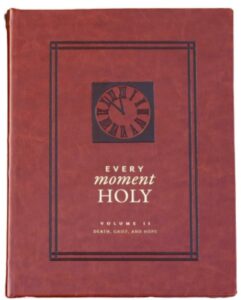 Every Moment Holy Volume 2: Death, Grief, and Hope Douglas McKelvey & Ned Bustard (Rabbit Room Press) $35.00 OUR SALE PRICE = $28.00 [and, now, as of February 2021, there is the new, compact-sized, flexible, leather edition; $25.00 OUR SALE PRICE = $20.00.] When ordering, please stipulate which edition you want.
Every Moment Holy Volume 2: Death, Grief, and Hope Douglas McKelvey & Ned Bustard (Rabbit Room Press) $35.00 OUR SALE PRICE = $28.00 [and, now, as of February 2021, there is the new, compact-sized, flexible, leather edition; $25.00 OUR SALE PRICE = $20.00.] When ordering, please stipulate which edition you want.
I suppose you know the extraordinary, handsome, and wildly popular Every Moment Holy Volume 1, a prayer book full of short liturgies and blessings and intercessions for all sorts of things throughout the day. This is a very special second volume, which, as the subtitle 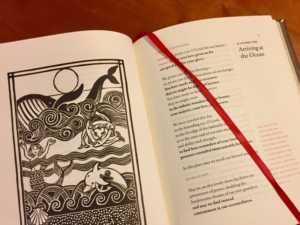 suggests, offers liturgies of lament, prayer for grief and loss. We enthusiastically award this handsome, tan, leather-bound hardback as one of the great books published in 2021 but you should know that just last week (in February 2021) we got the smaller, compact sized, softer leather edition. So both EMH Volume 1 and Volume 2 come in two sizes, bigger and smaller, all in leather. There are the $35 leather-covered hardbacks and the $25 pocket sized, flexible leather ones. And we have them all at 20% off. There should be a liturgy for ordering it, since it is (I am not kidding) a holy moment when you do.
suggests, offers liturgies of lament, prayer for grief and loss. We enthusiastically award this handsome, tan, leather-bound hardback as one of the great books published in 2021 but you should know that just last week (in February 2021) we got the smaller, compact sized, softer leather edition. So both EMH Volume 1 and Volume 2 come in two sizes, bigger and smaller, all in leather. There are the $35 leather-covered hardbacks and the $25 pocket sized, flexible leather ones. And we have them all at 20% off. There should be a liturgy for ordering it, since it is (I am not kidding) a holy moment when you do.
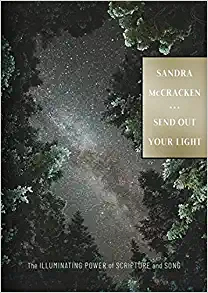 Send Out Your Light: The Illuminating Power of Scripture and Song Sandra McCracken (B+H) $22.99 OUR SALE PRICE = $18.39
Send Out Your Light: The Illuminating Power of Scripture and Song Sandra McCracken (B+H) $22.99 OUR SALE PRICE = $18.39
Sandra McCracken is a very cool and very talented songwriter, a true artist and storyteller. She is known by many for country-tinged, singer-songwriter songs of faith — psalms, laments, hymns, and pop influenced by deep truth. She is a beloved presence in the Indelible Grace projects and we adore her voice, her contemporary folkie style, her spiritual depth.
(She has, just for the record, worked with all sorts of folks we like —Porter’s Gate, All Sons and Daughters, Ellie Holcomb, and she is one of the moms in the terrific Rain for Roots. Significantly, she has worked with the good folks at Art House Nashville. Her brand new release (February 2022) is Carry Each Other which is a collection of cover songs, from Neil Young to Irving Berlin, Dylan to REM, Leonard Cohen, Nico, and more.)
Sandra has, perhaps more than some of us, experienced sadness in her life; her album Songs from the Valley on lament is extraordinary. She clings to the cross, to sovereign grace, to God’s goodness and grace, and continues to imagine the Kingdom coming. Those who know her music, religious and otherwise, know this about her.
This is, as far as we know, her very first book and it is a fabulous, smallish sized, handsome hardback. It is, I suppose, a daily devotional, but it is more than the typical short reflection on a Bible text. Send Out Your Light is nearly a memoir, a collection of short, personal essays, good words about her life, living in the light about God’s common graces in this world, in these times. As a performing artist and songwriter, she knows well the power of story and song, so Send Out Your Light does often come back to the power of music, including the songs in Scripture. It’s very good. Congrats, Sandra!
(Here is a one minute video about the book that is almost too pretty, but she says a good line or two, and there is a very cool bass line… She says, “Darkness does not have the final word.”)
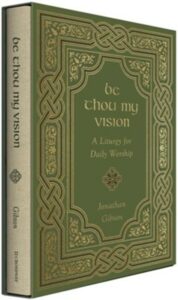 Be Thou My Vision: A Liturgy for Daily Worship Jonathan Gibson (Crossway) $29.99 OUR PRICE = $23.99
Be Thou My Vision: A Liturgy for Daily Worship Jonathan Gibson (Crossway) $29.99 OUR PRICE = $23.99
I hope you saw our announcement of this in December, describing it as a lush and classy hardback in a slip case, a liturgical prayer book with a Reformed theological perspective. It is designed with a Celtic aesthetic but it is not new age or pantheistic as some recent Celtic theologians tend to be. In fact, the daily offices are quite conventional, the Biblical ruminations historically classic Protestant orthodox, and the readings assigned for reflection are from the Reformed documents, the Heidelberg and Westminster Catechism. Whether this is fully your tradition of not, this daily prayer book is nearly one of a kind and we are glad for it. More than glad, we celebrate it and applaud those doing this kind of resource for those who want this kind of guided help for liturgical daily prayer. Excellent.
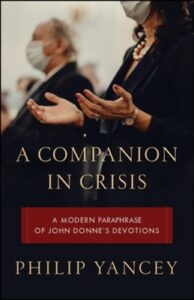 A Companion in Crisis: A Modern Paraphrase of John Donne’s Devotions Philip Yancey (Illumify) $14.99 OUR SALE PRICE = $11.99
A Companion in Crisis: A Modern Paraphrase of John Donne’s Devotions Philip Yancey (Illumify) $14.99 OUR SALE PRICE = $11.99
Slim as it may be, this is a book we simply have to name as an exceptional read this Year of our Lord, 2021. I described it at BookNotes, so here will just share the information the publisher (or perhaps Philip himself) wrote to describe it:
As the world entered a long dark night, Philip Yancey returned to a nearly 400-year-old manuscript for guidance. In it, he found a trustworthy companion for living through a global pandemic – or any other crisis. As Yancey says, “Nothing had prepared me for John Donne’s raw account of confrontations with God.”
Preacher and poet John Donne wrote Devotions in 1623, during a pandemic in his city of London. For a month he lay sick, hearing the church bell toll for others while wondering if his death would be next. From what he believed to be his deathbed, the great poet wrote a triumph of literature that has given us such familiar phrases as “No man is an island…” and “Never send to know for whom the bell tolls…”
This new version of a classic work is arranged as a 30-day reader based on Donne’s meditations, with startling relevance as we face similar questions.
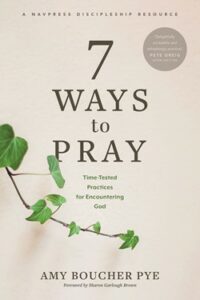 7 Ways to Pray: Time Tested Practices for Encountering God Amy Boucher Bye (NavPress) $14.99 OUR SALE PRICE = $11.99
7 Ways to Pray: Time Tested Practices for Encountering God Amy Boucher Bye (NavPress) $14.99 OUR SALE PRICE = $11.99
We have known of Amy Boucher Bye for years (we crossed paths decades ago when she worked with author and public speaker Os Guinness.) Over those decades she has moved to the UK, has studied Christian spirituality, earned a serious degree from the University of London, has published books and articles and devotionals, and has worked in evangelical ministry while raising a family.She is beloved and respected around the world. As we honor this book as a favorite this year, I’ll repeat just some of what I wrote in a longer BookNotes review last September.
This book is one that fills a certain kind of niche and we are very, very pleased to tell you about it; for us, this is the kind of book that we are always on the look-out for but (to be honest) is harder to come by than you might think. It is almost counter-intuitive that such a basic, clear, earnest, spiritually-minded book written with chatty storytelling and nice testimony would be such a stand out. Isn’t there a whole industry of evangelical self-help books, of pious and Biblically-based inspiration? Yes, but few that are as rooted in the broad and wide Christian communion and the ancient teachings of church history. And that, dear readers, makes 7 Ways to Pray nearly an anomaly. It is about the most clear-headed and basic (and I mean that as a compliment) guide to ancient prayer practices you are going to find.
Those that follow BookNotes or browse here at Hearts & Minds know that we love this whole genre of the literature of spiritual formation. Richard Foster’s Celebration of Discipline remains an essential read, one of the best books of our lifetime; I appreciate his Prayer: Finding the Heart’s True Home even better.We stock a lot of books like this, from heavyweights like the desert fathers and Orthodox mystics to Thomas Merton to the lovely and wise Henri Nouwen, from ancient classics like Theresa of Avila (and Theresa of Lisieux) to the more modern evangelical channels of this stuff such as Dallas Willard, Richard Foster, and Ruth Haley Barton.)
But yet, as Godly and deeply spiritual as most of these authors are, they are often just too deep for many of us. (One friend joked that he gets lost in the hallways of the Interior Castle.) And for those raised with the passionate and intimate language of evangelical revivalism and devotional piety of that sort, hearing about even the Examen (let alone prayer beads or icons) just doesn’t work, at least not at first. Sure, some make the effort and have a trusting heart so they forge into deeper waters with guides that sound a little odd to them. What we need is a translator, a clear writer who can simply tell of her own walk with the Lord and how these older, deeper saints can help us in our own discipleship.
And, as I suppose you can guess, Amy Boucher Pye is just that woman. Did I mention she writes for Our Daily Bread? She has this knack for telling a nice story to serve as a nice illustration, dropping into these accessible messages, rich, thoughtful quotes from Bernard of Clairvaux or Dietrich Bonhoeffer or Madame Guyon or Teresa of Avila or John Wesley. What a combo, lovely storytelling prose, Bible teaching, and intellectually solid spiritual guides to give it gravity.This really is a very fine, little book
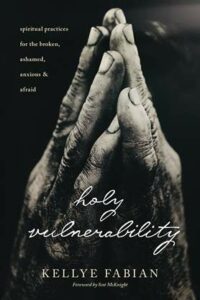 Holy Vulnerability: Spiritual Practices for the Broken, Ashamed, Anxious & Afraid Kelley Fabian (NavPress) $16.99 OUR SALE PRICE = $13.59
Holy Vulnerability: Spiritual Practices for the Broken, Ashamed, Anxious & Afraid Kelley Fabian (NavPress) $16.99 OUR SALE PRICE = $13.59
As I think of the many great books about spiritual formation, prayer, devotions, and cultivating our interior lives, I think also of those that can touch those of us who are weary, hurting, burned out, cynical. Yes, these laments are ancient — that is why there is so much of it in Holy Scripture — but there is a particular need in these stressful days.I am convinced this is one of the best books of the year because there is a need and this rings true. So true.
We’re grateful for this thoughtful woman who cares deeply about good questions and good, Biblical answers (she wrote the fabulous and fairly in-depth daily devotional called Sacred Questions: A Transformative Journey Through the Bible that we have touted.) But she knows (as she says in that earlier year-long devotional) that seeking solid doctrine and intellectual answers only gets us so far — we have to bring our whole (hurting) selves to God, we have to be, as she puts it here, vulnerable. If that previous book was a honest search for real answers and a Biblical imagination, this is about meeting God even if we’re not okay
“Our brokenness,” she says, “is an invitation to a deeper kind of wholeness.”
The forward to Holy Vulnerability is by Scot McKnight, a very successful New Testament scholar and ecumenically minded pastor. He has named this his favorite book this year about spirituality. He’s right, this is remarkable stuff as we offer our wounds to God, who will love us at those places.
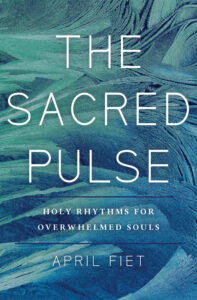 The Sacred Pulse: Holy Rhythms for Overwhelmed Souls April Fiet (Broadleaf) $17.99 OUR SALE PRICE = $14.39
The Sacred Pulse: Holy Rhythms for Overwhelmed Souls April Fiet (Broadleaf) $17.99 OUR SALE PRICE = $14.39
When this book came out, released this fall by the Broadleaf imprint, I wrote a bit about why we were eager to carry it, and why I hoped to dip into it soon. After a quick skim, and drawing on what the publisher told us, and the good reviews by people I trusted, I wrote about it. And then I got a few personal notes thanking me. Ms Fiet has a following, apparently, and she is a good colleague of folks I respect. It’s good when we get to connect like that and in time, she and I have exchanged a few quick emails. I have since come to value the book even more and we are pleased to honor it here in our overview of our favorite reads from last year.
As it says on the back cover of The Sacred Pulse, Fiet is offering insight into how “in a world of hustle and bravado, silencing the noise takes practice.” For those feeling “frazzled, overwhelmed, and out of sorts” from our contemporary life, this book might help us “examine the frantic pattern of perfection and production” so we might “reclaim deeper, sacred pulses.” Actually, she lays out twelve practices to help us do that. She says they are “sustainable and sustaining.” Who doesn’t want a more joyful and holy sense of things, a rhythm, even?
April Fiet is a pastor, writer, and blogger, She co-pastors First Presbyterian Church in Scottsbluff, Nebraska, and is on the editorial board of In All Things. She is a graduate of Western Seminary and has written in places like The Reformed Journal. And she has chickens, so what’s not to love?
Here are others suggesting this book to you. Wow, if these folks celebrate her work, we should too. It is surely one of the best of the year. Why not order one today?
April Fiet welcomes readers into a space that is both contemplative and practical. The book draws on a wealth of spiritual insight to help readers retreat from the busyness of life and recenter their lives around rhythms that heal, restore, and sustain. — Kristin Kobes DuMez, New York Times bestselling author of Jesus and John Wayne
I felt seen by this book, in a way that was uncomfortable at first. The unsettling insight into my frenetic performance for God was the opening I needed to hear April Fiet’s invitation: to learn to dance with God again, finding rhythms that are, paradoxically, like rest in motion. — James K. A. Smith, author of You Are What You Love and On the Road with Saint Augustine
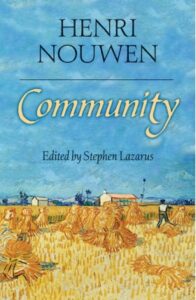 Community Henri Nouwen (Orbis Press) $25.00 OUR SALE PRICE = $20.00
Community Henri Nouwen (Orbis Press) $25.00 OUR SALE PRICE = $20.00
Wow, you read that right — a new book by Henri Nouwen. That deserves an award right there, doesn’t it? We rejoice.
It is compiled and lovingly edited by our friend Stephen Lazarus. (Stephen used to work for the Center for Public Justice (CPJ) in Washington DC and now lives in Toronto, serving as Director for Research and Special Projects act the Henri Nouwen Society.) This book draws together transcripts of talks and messages that have never been published before, together with excerpts of books and articles (again, some that have not been widely seen.) Together, with this new material and nicely woven together previously published content, we have what surely can her called a new book. Even if all of it was previously widely known, pulling his stuff on community together would be a service and make a lovely book. That some of this is from notes from retreats and transcripts of public addresses that have never been published makes this truly an extraordinary publication. What a gift to the world and how very needed it is now.
The good forward is by the senior editor at Orbis, Robert Ellsberg (who knew Henri, not to mention many colorful characters of the last half a century such as Dorothy Day.) He tells of first trying to get Henri to submit articles for the Catholic Worker, the famous paper founded by Dorothy that he was editing at the time. It’s a good story, and one of those early pieces is now chapter four of this new book. The longer introduction is by Stephen and it soars. What a lovely introduction to this longing for community in our lonely age and what a great introduction to this core theme of so much of Nouwen’s body of work, written and lived.
For many of us, it is hard to believe that this past year marked the 25th anniversary of Henri Nouwen’s journey to daybreak, his final return to the loving Father. How sad we were upon hearing about his death in Holland in 1996, on the way to film a talk in front of the famous Rembrandt painting (“Return of the Prodigal Son”) that graced the cover of one of his most popular books.
But his life and ministry live on, especially in L’Arche communities that continue with wounded healers of all kinds sharing life with the mentally and physically disabled. (One of Nouwen’s last full books was Adam, which told the story of a person he came to know at the Daybreak L’Arche.) Deep community, in other words, is one of the great legacies of the spirituality of Henri Nouwen.
Community, edited by Stephen Lazarus, has 10 solid chapters, in about 140 pages. Very, very nicely done, and a great grace for us all. I don’t want to seem pushy or crass, but you know, this really would make a lovely gift to somebody you know who loves Nouwen. Lots of people have many of his books and would be thrilled to hear about a new collection like this. It is an urgent topic, compiled with great love and care. We honor it as one of our favorite books of the year
THEOLOGY
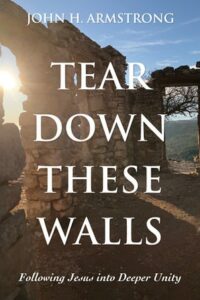 Tear Down These Walls: Following Jesus into Deeper Unity John Armstrong (Cascade) $23.00 OUR SALE PRICE = $18.40
Tear Down These Walls: Following Jesus into Deeper Unity John Armstrong (Cascade) $23.00 OUR SALE PRICE = $18.40
My friend John Armstrong has devoted three decades or more to the work of Christian unity. His story and ministry have encouraged many around the world and now they are reflected in this study, which includes some of his own story, almost like a theological memoir of a life devoted to unity.
“I am praying not only for these disciples but also for all who will ever believe in me through their message. I pray that they will all be one, just as you and I are one-as you are in me, Father, and I am in you. And may they be in us so that the world will believe you sent me” (John 17:20-21, NLT).
As John notes, “For most Christians these words of Jesus seem like an unreachable ideal. Or they promise spiritual unity without a visible demonstration between real people. Some even read these words with a sense of fear seeing this text used for a compromise agenda. How should we understand this prayer offered for all who follow Jesus?”
The publisher explains:
What if Jesus really intended for the world to “believe” the gospel on the basis of looking at Christians who live in deep unity in a shared relationship with him? What if there is a way of understanding what Jesus desired so that we can begin anew to tear down the many walls of division that keep the world from seeing God’s love in us? Is our oneness much bigger and deeper than we could imagine?
I adore this important work, growing out of John’s important work as an evangelical commitment to inter-denominational unity — shaped by a vision to reach the watching world (which he calls “missional ecumenism.”) He is the founder of The Initiative, which is described as a community of Christians from many backgrounds who walk together in a covenant with Jesus and his followers so that the love of Jesus might exceed all divisions. He is the author/editor of fifteen books and a minister of Word and sacrament in the Reformed Church in America.
A few who follow BookNotes know that we used to promote his early book on this topic, Your Church is Too Small, which meant, of course, that your idea and experience of the church is often too small. We think of the church as our congregation, our denomination, our tribe. That book formed the basis for this greatly changed and significantly reworked new volume, written with the same heart for the gospel and loyalty to the people of God, where Christ’s church is found. This is inspiring, good stuff, helping us live out in church life the sort of love he wrote about in his excellent 2107 book Costly Love: Costly Love: The Way to True Unity for All the Followers of Jesus.
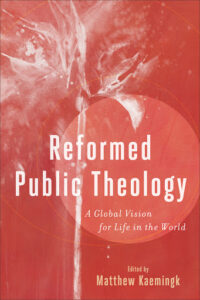 Reformed Public Theology: A Global Vision for Life in the World edited by Matthew Kaemingk (Baker Academic) $29.99 OUR SALE PRICE = $23.99
Reformed Public Theology: A Global Vision for Life in the World edited by Matthew Kaemingk (Baker Academic) $29.99 OUR SALE PRICE = $23.99
It is hard to convince readers how rewarding it is to own a collection of dozens of great pieces, on so many different topics (from Christian views of fashion to refugee ministry, from a theology of work to a Christian perspective on citizenship) written by smart scholars/practitioners from around the world. It is still sometimes hard to suggest that theology is not just doctrine for church life but can be opened up and generative for public thinking as well. I am positive that for many of our customers, if you had a volume of “public theology” like this readily available, you’d dip into it as a reference the next time somebody makes a comment or asks you a question about the arts or colonialism or worship or economics or other topics of public interest. It is a treasure chest of Godly insight, written by folks (using case studies) from all over the world.
I award this a Best Book of 2021 award not only because of the breadth of scholarship and the wisdom embodied by the authors of the fascinating individual chapters — a collective testimony to the vanguard of the Kingdom of God, showing renewal in many areas of life, from many corners of the globe — but because of how the book holds together. You see, it is a book that honors the leadership, public thinking, and mentorship of Richard Mouw. This was a surprise volume, compiled and released to honor his retirement from Fuller Theological Seminary and the authors almost uniformly offer some hat tip to the neo-Calvinist worldview that shapes the public philosophy and social theology and sweet piety of Dr. Mouw.
Remember that BookNotes we did a few weeks ago celebrating a book exploring the strengths and weaknesses of Abraham Kuyper and his famous “Stone Lectures” about the Lordship of Christ across every sphere of society? In some ways, some of that renewal of Dutch Reformed thinking influenced Mouw, who himself mentored dozens of young, global scholars. Indeed, one of the editors of Calvinism for a Secular Age, Jessica Joustra, has a good chapter in here. She, too, here, celebrates Rich Mouw as a friend, mentor, and distinctive public intellectual. This book is a treasure and it deserves to be honored among us, even as it honors the work of Richard Mouw.
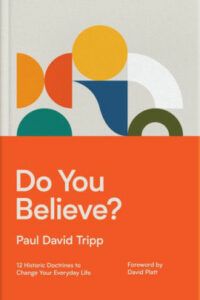 Do You Believe? 12 Historic Doctrines to Change Your Everyday Life Paul David Tripp (Crossway) $32.99 OUR SALE PRICE = 26.39
Do You Believe? 12 Historic Doctrines to Change Your Everyday Life Paul David Tripp (Crossway) $32.99 OUR SALE PRICE = 26.39
I am eager to honor this book as a favorite book we’ve carried this year, even though I’m not fully sure I agree with all of it —again, that may make it a good book, pressing us to think for ourselves, to ponder both the ideas it offers and the fruit it generates. I am excited about Do You Believe? as it offers a lively, systematic, thoughtful but not arcane overview of the major classic doctrines that most Christians should know about and cherish. Whether we end up articulating them in the way Tripp does is not essential, but knowing something about the historic and classic perspective he offers here is helpful. This is one of the better books of basic introductory theology for ordinary readers that I have seen in years.
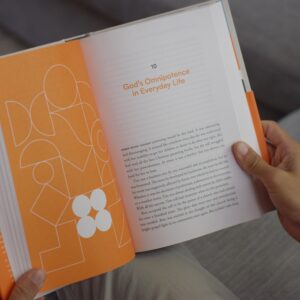 Here is a reason this handsome book (complete with some graphic design touches and symbols for each of 15 key doctrines) is better than many. Following each chapter there is another chapter on how this theological truth could positively effect your life and impact your life with God, your sense of your very self, your relationships with others, your understanding of your church, your responsibilities in the world. If all this studious theological orientation doesn’t form us as better followers of Jesus for the sake of His glory and our neighbor good, if it doesn’t better our faith and our service in the world, then, really, why bother.
Here is a reason this handsome book (complete with some graphic design touches and symbols for each of 15 key doctrines) is better than many. Following each chapter there is another chapter on how this theological truth could positively effect your life and impact your life with God, your sense of your very self, your relationships with others, your understanding of your church, your responsibilities in the world. If all this studious theological orientation doesn’t form us as better followers of Jesus for the sake of His glory and our neighbor good, if it doesn’t better our faith and our service in the world, then, really, why bother.
A big thumbs up for this major effort to write a theology book with practical application, to root our hope and healing of our troubled lives in the historic doctrines of faith as understood, at least, by Tripps’ fairly conservative, Reformed theological tradition.
He has written other books about applying the Bible to life — with books about awe and wonder, with books about sin and brokenness, with books about our personal fears and foibles, and with books about relationships and personal integrity. He has written about sex, money, addictions, parenting, and more. One of his most beloved books is an intense daily devotional called New Morning Mercies.
Whenever a fresh article or book by Paul David Tripp is released, I take note. I am an avid follower of his counsel, for no matter how many others might cut me slack–I am, after all, a lifelong quadriplegic–I know Paul David Tripp will insist that I interpret my difficult circumstances, as well as my response to them, solely through the lens of Scripture. Although we rarely cross paths, my friend knows my heart, and how prone I am to wander. It’s why I am especially excited about his new work, Do You Believe? Our life in Christ thrives only when we are rooted in the great doctrines of the faith, and Paul David Tripp does a stellar job of presenting the fundamentals. Whether you already have a grasp on Christian doctrine or are just getting started, this should be your next read! — Joni Eareckson Tada, founder, Joni and Friends International Disability Center
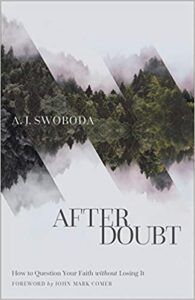 After Doubt: How to Question Your Faith Without Losing It A. J. Swoboda (Brazos Press) $18.99 OUR SALE PRICE = $15.19
After Doubt: How to Question Your Faith Without Losing It A. J. Swoboda (Brazos Press) $18.99 OUR SALE PRICE = $15.19
This is another great book that we highly recommended at BookNotes when it came out last March. We were early fans and very glad for it. It is the best book on this perennial subject in quite a while.
(I must say I had hoped, but did not have time, to compare and contrast it with the book on doubt that Brian McLaren had released a few months earlier called Faith After Doubt: Why Your Beliefs Stopped Working and What to Do about It ($26.99; OUR SALE PRICE = $21.59. Brian is following up that book, by the way, with Should I Stay Christian:A Guide for the Doubters, the Disappointed, and the Disillusioned, coming in May 2022 and we are sure to suggest it here later this Spring.)
Swoboda is a very sharp thinker and we have stocked all his books and often recommend his must-read Subversive Sabbath and the excellent one he helped with, Introducing Evangelical Ecotheology: Foundations in Scripture, Theology, History, and Praxis. Almost always in any Lent lists we make we recommend his very helpful, raw, even really like called A Glorious Dark: Finding Hope in the Tension Between Belief and Experience which is perfect for that dark time from Good Friday to Easter Sunday. And before that, he wrote The Dusty Ones: Why Wandering Deepens Your Faith. Do you see a theme here? The brother – who has also written about the joy of the Holy Spirit experience in his exuberant Pentecostal past — has experienced some hard stuff, has wandered and wondered and doubted. Most of these excellent books have led up to this, his magisterial work, After Doubt.
I did not list this book in our PART ONE of our “Best Books of 2021” although I surely could have, there among basic Christian living sorts of titles. This is not an academic book on systematic theology as such. And yet, it is so astute about theological arguments, about doctrinal questions, and about how our own consonance with all of that does or doesn’t ring true, that it seems that this is what we might call applied theology at its best.
Swoboda could do academic theology with the best of them, straight down the line. But here, he works as a fellow pilgrim, a doubter who isn’t afraid to wonder. As we said in our first BookNotes review, it is ideal for those who are deconstructing their faith, for those afraid of their journey, who wonder about how to question faith in a fruitful way. It is meaty, but not super scholarly, thoughtful without being dense. Perfect.
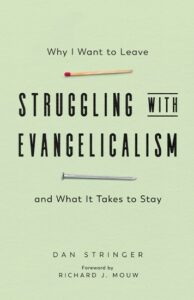 Struggling with Evangelicalism: Why I Want to Leave and What It Takes to Stay Dan Stringer (IVP) $17.00 OUR SALE PRICE = $13.60
Struggling with Evangelicalism: Why I Want to Leave and What It Takes to Stay Dan Stringer (IVP) $17.00 OUR SALE PRICE = $13.60
Again, I suppose this is not theology proper, but it is very much about theology, or a theological tradition. Or at least a movement with certain sorts of theological dispositions and tones. What is evangelicalism, anyway? And why would a justice-seeking, seriously academic, third culture kid with amazing cross-cultural and global sensibility care about this rather specific, in-house debate about the movement and tradition we call evangelicalism? Well, you’ve got to read this remarkable book to learn more, but I am confident it will help man. Those with big, understandable beefs with the tradition and those who, like Dan, still see beauty and goodness in the simple, gospel-centered focus of evangelical faith and discipleship.
There have been other such books and this now stands alongside another excellent collection of essays on this topic, Still Evangelical? Insiders Reconsider Political, Social, and Theological Meaning (including authors who say, more or less, yes, no, or maybe.) As a more sustained narrative, Struggling with Evangelicalism is, perhaps now, the best book I’ve seen on this.
I love the small detail on the cover— the matchstick and the nail. That is, do we burn down this dysfunctional house, this wooden structure around the good news, or do we get to work and rebuild it as needed? As the generous forward by Rich Mouw notes, there are very legitimate matters at stake here, and some of it seems to be generational. Mouw says that Stringer was once his student but now he is his teacher. Mouw notes that this good book helps him understand “both the brokenness and the beauty of this tradition I love.” It can help you, too. It is a great gift, one of the best of the year.
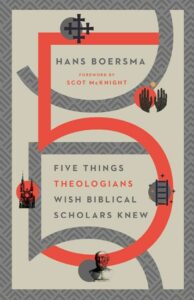 Five Things Theologians Wish Biblical Scholars Knew Hans Boersma (with a foreword Scot McKnight) (IVP Academic) $20.00 OUR SALE PRICE = $16.00
Five Things Theologians Wish Biblical Scholars Knew Hans Boersma (with a foreword Scot McKnight) (IVP Academic) $20.00 OUR SALE PRICE = $16.00
Five Things Biblical Scholars Wish Theologians Knew Scott McKnight (with a foreword by Hans Boersma) (IVP Academic) $20.00 OUR SALE PRICE = $16.00
We award IinterVarsity Press Academic a very cool award here for this combo set of two books, one by a theologian wishing Bible scholars would pay attention to their deep concerns, and the other by a Bible guy, explaining why he wishes theologians would pay a bit more attention to their Biblical studies. Both make really good points. I liked 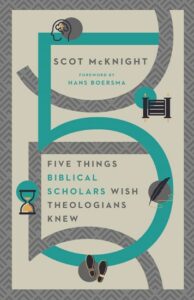 them both, mostly (alhtough Boersma’s apologetic for a Christian sort of Platonism is more than a bit odd, if you ask me.) Their respective forwards, each to the other guy’s book are friendly and collaborative — nice!
them both, mostly (alhtough Boersma’s apologetic for a Christian sort of Platonism is more than a bit odd, if you ask me.) Their respective forwards, each to the other guy’s book are friendly and collaborative — nice!
This is really a great project and you’ll learn a bit about theology (and, too, how Biblical studies work goes) by reading them. These are thoughtful, but not arcane, very helpful for all educated readers, each bringing good insight and balance to the other. Kudos.
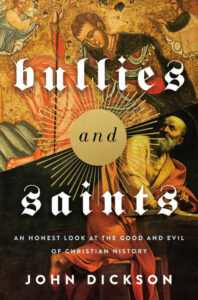 Bullies and Saints: An Honest Look at the Good and Evil of Christian History John Dickson (Zondervan Academic) $28.99 OUR SALE PRICE = $23.19
Bullies and Saints: An Honest Look at the Good and Evil of Christian History John Dickson (Zondervan Academic) $28.99 OUR SALE PRICE = $23.19
I suppose a book of honest church history may not be theology proper. But we wanted to honor this, so I’m sneaking it in here, naming it as a treasure published this year, good for any number of readers. I don’t know this, I suppose, but this very good work could have been done at least in part, I might surmise, to convince the skeptic and seeker that even with the awful stuff that has been done in God’s name through the church, the gospel still might be worth considering. If so, it is a winner in the apologetics category as well, because it is very useful, if an honest skeptic will work through it. Perhaps you need to read it and be prepared to summarize it’s candid approach.
As Dr. Teresa Morgan (Professor of Graeco-Roman History at the University of Oxford) says, it is “one of the most honest, challenging, and compelling cases for Christianity you will ever read!”
Bullies and Saints is compelling, then, because it shares the “good, the bad, and the ugly” and this is one of its great values. But, aside from that strategy, offering an unvarnished approach, it really is well written, full of fascinating information, a college class between two covers. Some church history books are just too tedious, detailed with frankly more than most of us care to know. Others are too brief; some are sectarian and woefully biased, and many explore mostly the doctrines and heresies (fair enough, it’s all very important) and miss the social/cultural/political goings-on. For a lay reader, Dickson seems to get it just about perfect in a good style and delightfully balanced and paced. Others who also say so include Tom Holland and Philip Jenkins and Michael Spence who calls it “erudite and immensely readable.” That’s an achievement right there, no?
Listen to this great encouragement from Dr. Rebecca McLaughlin, author of Confronting Christianity:
This is a measured and masterful retelling… Read it and weep, smile, question, cogitate and sing.
RACE & RACISM
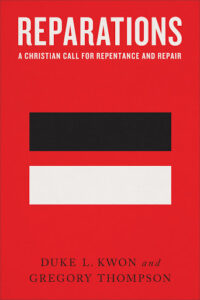 Reparations: A Christian Call for Repentance and Repair Duke Kwon & Gregory Thompson (Brazos Press) $24.99 OUR SALE PRICE = $19.99
Reparations: A Christian Call for Repentance and Repair Duke Kwon & Gregory Thompson (Brazos Press) $24.99 OUR SALE PRICE = $19.99
I reviewed this in early April of last year and there I said it would be considered one of the best books of 2021. I still think so. It is worthy of honoring, celebrating, buying, reading, discussing. You may not think their Biblical and theological study is adequate, but it is very good; you must admit that. You may not agree with their very tentative conclusions; even they may not be sure what comes next. But it will make you think, and, possibly, think in new ways, animated by Biblical teachings and guided by a passion for public justice. Golly, if that isn’t the mark of a good book — helping you think well in light of Biblical teaching and applied to modern perplexities — then I don’t know what is. Read my remarks about it here:
Here’s a paragraph or two from that review:
Perhaps one of the reasons I think this is surely one of the best books of 2021 is because it is tackling a question that has been raised in several places, talked about in almost quiet hushes as a dreaded topic. Who doesn’t want to work against racism? Who doesn’t even realize there are some structural or institutional obstacles that have to be addressed (not least prejudicial policing and judicial practices that cause what has come to be called racist mass incarceration. Most people of good faith know that racism remains an issue and cause for lament and anyone who knows their Bible knows that breaking down cultural and ethic barriers is a constant theme of the gospel itself.
But reparations? Really?
This is controversial stuff and seemingly endlessly complicated, impossible, perhaps, to wisely adjudicate even if one concedes that the wealth of most established white Americans has been derived from systems set up years ago that were exploitive, unjust, and caused a unarguable housing, education and material asset gap between races. Most of us know now about the inequities even after World War II, how white people of my parents generation got what we all called the G.I. Bill, even though black soldiers did not. Most of us now know that loans were widely available for baby booming young white families to populate the growing suburbs in the middle of the 20th century but red-lining and other fundamentally unfair banking and real estate practices continued even after they were denounced and, in some cases, prohibited. But, still, that was years ago and who should pay whom to make things right? It’s almost too much to ask, and so we do not think about it much. Are we all really implicated in our place in history? There is no overtly Christian book like this that I know of that is doing this sort of serious, thoughtful, and important work, adding to this necessary conversation.
Again, I think Reparations: A Christian Call for Repentance and Repair, is very important and although I guess I cannot promise this to all readers, I found it hard to put down. It is gripping, compelling, interesting, inspiring, wise. Our friend Tish Harrison Warren calls it “a rare book” that is “blessedly troubling.” The Biblical scholarship is impressive, the footnotes are fabulous, the stories moving, and careful suggestions really stimulating.
I am glad for the long introductory chapter that highlights three sorts of understandings of, or levels of, racism, to which they add a fourth. This is very good stuff and worth the price of the book just to have these clear descriptions and insights at your fingertips. A valuable book for any year, and a Very Best of 2021.
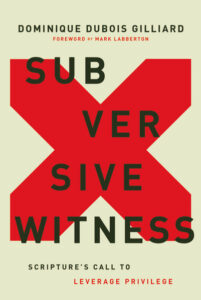 Subversive Witness: Scripture’s Call to Leverage Privilege Dominique Dubois Gilliard (Zondervan) $24.99 OUR SALE PRICE = $19.99
Subversive Witness: Scripture’s Call to Leverage Privilege Dominique Dubois Gilliard (Zondervan) $24.99 OUR SALE PRICE = $19.99
I have been planning on doing a long list of recent books about race and racism that we appreciated having here in 2021. There are a few great ones that fit the needs of our audience and this is certainly one of them. I have not reviewed it extensively but hope to — allow me just to say that this author is a leader you should know. Latasha Morrison (who I’m sure you know from her bestselling Be the Bridge) says he is “a gift to the church” Authors like Soong-Chan Rah and Jenny Yang and Jemar Tisby all rave.
Dominique DuBois Gilliard is a very fine writer — his first one was Rethinking Incarceration: Advocating for Justice that Restores and it was brilliant and vital. He is an ordained minister and serves as the director of racial righteousness and reconciliation for the Evangelical Covenant Church. (He is also on the Board of the Christian Community Development Association.) I simply thank God for him and his gracious commitment to Biblical righteousness in all its fullness and his kind (if frank) exploration of the privilege many of us carry and benefit from.
The forward by Mark Labberton, now President of Fuller Theological Seminary, is itself very good and sets the stage well for hearing from this black brother as he helpfully explores what we mean by privilege, how to steward it well, what it might look like to “leverage it.”
As Soon-Chan Rah puts it,
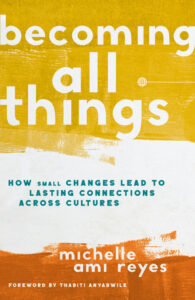 to Lasting Connections Across Cultures Michelle Ami Reyes (Zondervan Reflective) $22.99 OUR SALE PRICE = $18.39
to Lasting Connections Across Cultures Michelle Ami Reyes (Zondervan Reflective) $22.99 OUR SALE PRICE = $18.39
I highlight this as one of the best books of the year in part because it is so very practical. It is rooted in a solid understanding of race and racism in the Bible and it understands much about the questions of equitable inclusion and multi-ethnic diversity.As a leader of the Asian American Christian Collaborate, as co-executive of Pax, and as a scholar in residence at Hope Community Church, a great multicultural church in Austin, she knows how to carefully navigate meaningful change. She would not deny that large policy questions are important, that we need a truly Christ-like view of questions of immigration and voting rights and funding of poverty-stricken schools. But, also — and this is the burden of this fine book — we have to learn to adopt the Apostle Paul’s adage (of being “all things to all people”) in plausible and helpful ways.
Can small changes really “lead to lasting connections across cultures”? He watches it happen in her work in Austin and she knows how to equip us to follow suit. As oneDorena Williamson (author of Colorfull) writes, “This book stirs in me, after decades of multiethnic leadership, an even greater desire to experience God’s diverse kingdom on earth as it is in heaven.”
Do you need a book to “stir you” to desire God’s (multiethnic) kingdom? We simply cannot ignore discussions about cultural identity and cross-cultural engagement. This is a helpful guide to help you walk through this work.
If you are ready to lean in and grow in your understanding of your “neighbor,” then Becoming All Things is the book for you.— Terence Lester, author of When We Stand and I See You
As a mixed-race Christian professor of ethnic studies, I wish that I had read this book twenty years ago. Reyes offers a road map for cultural understanding that is vital for the rebuilding of the church in America.—Dr. Robert Chao Romero, author of Brown Church
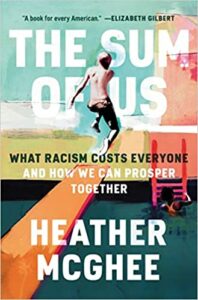 The Sum of Us: What Racism Costs Everyone and How We Can Prosper Together Heather McGhee (One World) $18.00 OUR SALE PRICE = $14.40
The Sum of Us: What Racism Costs Everyone and How We Can Prosper Together Heather McGhee (One World) $18.00 OUR SALE PRICE = $14.40
I should hardly have to explain why this is so very good. Ibram X. Kendi says, boldly, “This is the book I’ve been waiting for.” Wes Moore (of the unforgettable The Other Wes Moore and Five Days says, “The beauty and power of this book is blinding.” The extraordinary George Saunders (Lincoln in the Bardo) writes that it is “vital, urgent, stirring, beautifully written.” Chris Hays assures us that “Heather McGee is one of the wisest, most penetrating, most brilliant minds to set herself to the Big Problem of American democracy.” I has been reviewed widely and discussed on the good chat shows on NPR.
Sum of Us was long listed for any number of prestigious awards (including the National Book Award) and the Andrew Carnegie Medal. It was on the Best of 2021 lists in many major book review journals and it is our delight to add our voice, small and late as it may be.
This study, The Sum of Us, is an exploration of the nexus of race, class, and politics. It is written with care, with kindness, with insight, and without turning away from the complex matters of economics, racism, religion, and more. It shows in significant ways not only how we got into the mess we are in but ways to proceed.And some of it — the “solidarity dividend” — can happen, she shows, in houses of worship.
McGhee does not say all that needs to be said and she may or may not be right in all her analysis although with expertise in economics and policy (and a law degree) I wouldn’t want to argue with her. The Sum of Us is a very important contribution, for its insight, her authority, and the power to change that could come if we heed even some of what she proposes.
Here is how the publisher describes her project:
Heather C. McGhee’s specialty is the American economy–and the mystery of why it so often fails the American public. As she dug into subject after subject, from the financial crisis to declining wages to collapsing public infrastructure, she found a common problem at the bottom of them all: racism–but not just in the obvious ways that hurt people of color. Racism has costs for white people, too. It’s the common denominator in our most vexing public problems, even beyond our economy. It is at the core of the dysfunction of our democracy and even the spiritual and moral crises that grip us. Racism is a toxin in the American body and it weakens us all. But how did this happen? And is there a way out? To find the way, McGhee embarks on a deeply personal journey across the country from Mississippi to Maine, tallying up what we lose when we buy into the zero-sum paradigm–the idea that progress for some of us must come at the expense of others. Along the way, she collects the stories of white people who confide in her about losing their homes, their dreams and their shot at a better job to the toxic mix of American racism and greed. This is the story of how public goods in this country–from parks and pools to functioning schools–have become private luxuries…
Bad Faith: 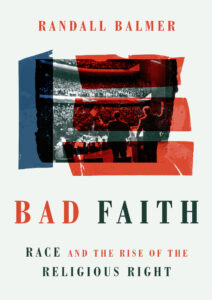 Race and the Rise of the Religious Right Randall Balmer (Eerdmans) $16.99 OUR SALE PRICE = $13.59
Race and the Rise of the Religious Right Randall Balmer (Eerdmans) $16.99 OUR SALE PRICE = $13.59
This is a thin, compact-sized hardback and, as they say, worth its weight in gold. He is not the first to document this sinfully tragic mingling of fundamentalism and politics and how it was driven by racism, but it is concise, clear, exceedingly compelling with undeniable documentation. We have in recent years told folks that Jemar Tisby’s The Color of Compromise is the essential must-read book to introduce people of faith to the way Christianity in the US has been compromised (since our founding) by crass, unbiblical, ugly, cruel racism. We must add this, now, to that “must read” list, specifically for those wanting a powerful study of recent history.
In fact, Jemar Tisby himself writes:
Fantastic… Before you read another headline or write another social media post about religion, race, or politics, read this book.
Lisa Sharon Harper, author of the recently released historical study, Fortune: How Race Broke My Family and the World–And How to Repair It All, puts it colorfully:
Bad Faith is the essential reader for all who want to know how America was pushed to the brink and how the evangelical church was led off a cliff.
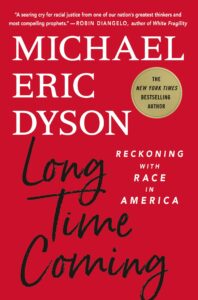 Long Time Coming: Reckoning with Race in America Michael Eric Dyson (St. Martin’s Press) $25.99 OUR SALE PRICE = $20.79
Long Time Coming: Reckoning with Race in America Michael Eric Dyson (St. Martin’s Press) $25.99 OUR SALE PRICE = $20.79
This is another in the compact sized hardbacks Dyson has graced us with. He is one of the most important and interesting public intellectuals in our time and is a great writer, a distinguished professor, a pastor, and a vivid public speaker (Obama once said, probably referring to himself, “Anyone who speaks after Michael Dyson pales in comparison.”)
I so value his remarkable book about RFK and Baldwin; his Tears We Cannot Stop could break you open. This is a third in that compact sized series and is fierce and eloquent, tracing the roots of racism in clear, fresh ways. Bryan Stevenson says it is “formidable” and “has much to offer on our nation’s crucial need for racial reckoning and the way forward.”
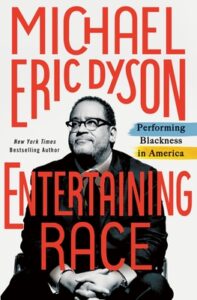 Entertaining Race: Performing Blackness in America Michael Eric Dyson (St. Martin’s Press) $32.50 OUR SALE PRICE = $26.00
Entertaining Race: Performing Blackness in America Michael Eric Dyson (St. Martin’s Press) $32.50 OUR SALE PRICE = $26.00
I raved about this in a previous BookNotes but I’m not sure people believed me when I told them how exceptional it is, how learned, informed, thoughtful, funny, fascinating and important it is. It is a feast, so informative and interesting. I linked, I think, to a hilarious bit he did on Late Night with Stephen Colbert where he kept extolling Beyoncé. It was a hoot. I love this book, a veritable greatest hits of his many, many pieces about black artists, entertainers, public figures, activists, preachers and, did I mention Beyoncé?
Here is just a little of that BookNotes review I did:
Entertaining Race is a book to spend years with, perhaps, laughing and crying and maybe scratching your head a bit. He is hard-hitting about racism and injustice, but is not only in the key of lament. Dyson truly enjoys pop culture, film, music, theatre.Some of these chapters are about sports, which he obviously enjoys.Some about politics and some are pretty weighty. He knows the West’s intellectual history well and is schooled in philosophy and intellectual history and can also bring in hip hop and Hollywood references in his discussions of Descartes or Abraham Lincoln or in discussion with, say, Jean Bethke Elshtain. And did I mention he adores Beyonce?
But that doesn’t mean he’s always seen as cool, let alone beloved — he got death threats and called out by his chancellor, with demands that he be fired from the University of North Carolina in 1996 when he defended pop culture, citing Kurt Cobain to Snoop Dogg in a notorious, big commencement speech. He includes it here, saying, “you can read for yourself whether the criticism was warranted.”
POPULAR CULTURE
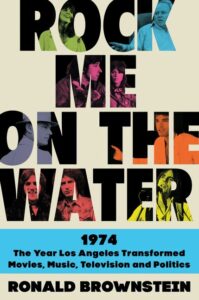 Rock Me On the Water: 1974 – The Year Los Angeles Transformed Movies, Music, Television, and Politics Ronald Brownstein (Harper) $29.99 OUR SALE PRICE = $23.99
Rock Me On the Water: 1974 – The Year Los Angeles Transformed Movies, Music, Television, and Politics Ronald Brownstein (Harper) $29.99 OUR SALE PRICE = $23.99
If you are a fan of the early to mid-70s, if you remember the early Eagles and the rise of Joni Mitchell and the huge shift in movies and TV about that time, not to mention the rise of certain sorts of soul, the ongoing anti-Viet Nam war movement (and the documentary “Hearts & Minds — ahem!), the controversies with Jane Fonda, the rise of celebrities engaged in radical politics, etc. etc. this book is the best thing I’ve read in years. I couldn’t put it down.
I graduated from high school in 1972 and was working part time in a record store at the time and these were my coming-of-age years. I have never quite considered all that happened in this one seminal year and I never quite placed it all in LA.New York became important later, with disco and punk and SNL. But CSN? The Godfather II? The rise of Archie Bunker and MASH and the major shift in TV? Month by month, Brownstein walks us through the drama and tragedy and idealism of the city of Angels. Rock Me on the Water book blew me away, pointing out on almost every page fascinating stuff about popular culture that I never quite pieced together. It is amazing how older and conventional the most popular films and TV were even in, say, 1968. Cultural critics who say the 60’s didn’t end until almost the mid-70s are right on!
I really, really loved this book, and not just because of the Jackson Browne title on the cover. The film parts, the TV, the politics? All fabulously interesting.
Rock Me On The Water documents the high-octane storybook world of Los Angeles in 1974 with masterful intimacy and fearless cultural analysis. His well-rendered portraits of Jackson Browne, Linda Rondstadt, Joni Mitchell, David Geffen and other luminaries of the time are sublime. This is an extremely kinetic historical document, and a testament to Brownstein’s lasting importance as both a fact-driven journalist and elegant prose-stylist. A must read! — Douglas Brinkley, author of American Moonshot
Brownstein’s kaleidoscopic account of a historic generational transformation that took place in American culture, American politics, and American life in the crucible of modern Los Angeles during the magical year of 1974. It encapsulates in compelling detail the moment when young people and young ideas were moving in on an older generation, based on the strength of new-found creativity and idealism. It documents the triumphs and failures of that new generation with vividness, humor, and, most of all, deep understanding. Running through every page is the author’s deep love for his adopted home. A beautiful ride through an unforgettable time.— Jon Landau
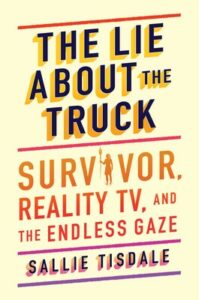 The Lie About the Truck: Survivor, Really TV, and the Endless Gaze Sallie Tisdale (Gallery Books) $27.00 OUR SALE PRICE = $21.60
The Lie About the Truck: Survivor, Really TV, and the Endless Gaze Sallie Tisdale (Gallery Books) $27.00 OUR SALE PRICE = $21.60
Every once in a while we want to salute a book just because we know somebody out there cares. You know who you are.
Do you know the reputation of this inquisitive and glorious writer? Some say she is a genius. The Boston Globe says that although she is an easy, chatty writer, she “never says anything the way you’re expecting which makes reading her a pleasure.” The Seattle Times says her prose is “music for the mind’s ear.” Colorfully creative as a wordsmith, her research is considered meticulous.
Meghan Duam, author of The Problem with Everything, says that “Sallie Tisdale is the real thing, a writer who thinks like a philosopher, observes like a journalist, and sings on the page like a poet.” You just have to like an author described like that!
Do you know the truck? More specifically, the lie about the truck? I did not. I did not care, for that matter. I still, don’t, really. And yet, here we are, listing this as a book to be honored this year.
I read a great review in maybe Publisher’s Weekly and was hooked. Here is how the publisher themselves describe this:
What is the truth?
In a world of fake news and rampant conspiracy theories, the nature of truth has increasingly blurry borders. In this clever and timely cultural commentary, award-winning author Sallie Tisdale tackles this issue by framing it in a familiar way — reality TV, particularly the long-running CBS show Survivor.
With humor and in-depth superfan analysis, Tisdale explores the distinction between suspended disbelief and true authenticity both in how we watch shows like Survivor, and in how we perceive the world around us.
Well, if that is even somewhat true, it deserves to be held up as a significant title for this year.
 Music Is History Questlove (Abrams Image) $29.99 OUR SALE PRICE = $23.99
Music Is History Questlove (Abrams Image) $29.99 OUR SALE PRICE = $23.99
Time is running out for me here, and I’m not finished with this yet. It is more substantial than I expected. It is about music. It is about history. I should have realized that.
We love Questlove and we respect his work as an artist, as a spokesperson, as activist. In Music Is History the five-time Grammy musician, producer, and bandleader, the musical director for The Tonight Show with Jimmy Fallon, shows his chops as writer. We picked this up in the wake of the breathtaking, spectacular Summer of Soul that he produced, one of the cultural highlights of this hard year of 2021. I figured the book might be mostly about those well known black singers.
If Rock Me on the Water was a book I thoroughly enjoyed, understood, related to — I’ll admit I briefly met a few of the people mentioned — some of Music Is History is new stuff for me. Questlove starts in 1971 and goes year by year up until the present, explaining music that was popular and music that was popular in circles I didn’t travel in. He is curious about history and combines his deep expertise in pop music to explore what America has been about in the past 50 years.
It is an intimate conversation with an influential musician of today and it is a black musician’s take on recent American history. What a book! What a blast!
 She Come By It Natural: Dolly Parton and the Women Who Lived Her Songs Sarah Smarsh (Scribner) $16.00 OUR SALE PRICE = $12.80
She Come By It Natural: Dolly Parton and the Women Who Lived Her Songs Sarah Smarsh (Scribner) $16.00 OUR SALE PRICE = $12.80
I so thoroughly enjoyed this book that I wanted to tell folks about it all fall of 2021, when I discovered the paperback that had just released. (Yes, the hardback came out in 2020, but, like Dolly, I’m making the most of things the best I can.) I have to admit that the main thing that drew me to this at first was that it was written by Sarah Smarsh, author of Heartland: A Memoir of Working Hard and Being Broke in the Richest Country on Earth. It is a mid-West / heartland memoir about her rural family with working class roots (who, among other things, listened to Dolly Parton music.) Smarsh and her mom are fiesty, smart women who were not well off and, well, her own life story seems to converge, or at least cross over, the Appalachian story of Dolly and her roots music. Dolly and her struggles, her darn hard work, her faith, her loyalty to her Appalachian life.
She Come By It Naturally was, in fact, mostly published in the fabulous Americana music journal No Depression and Smarsh’s weaving it into a great little book earned her a finalist position in the National Book Critics Circle Award (and was on several end of the year “must read books of 2020.”)
I had no idea Dolly was so extraordinary, such a character, so accomplished at so much. I didn’t realize how her wholesome feminism was controversial — there was a bit about it in the great Ken Burns’ documents on country music, I recall — and Smarsh colorfully dishes on all of it. Her intersectional study of the relationship of class and gender and race and geography is insightful without being pedantic. As the back cover says, “Infused with Smarsh’s trademark intelligence and humanity, this insightful examination is a tribute to Dolly part and the organic feminism she embodies.”
I like the line from the Time review:
Stirring, insightful… Smarsh anoints Parton a badly needed beacon: in a divided country, she remains that rare someone who everyone can love.
I enjoyed this so much, I think I’m going to read it again real soon.
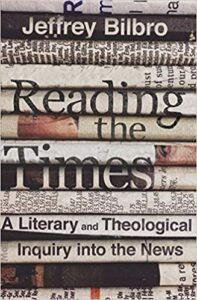 Reading the Times: A Literary and Theological Inquiry Into the News Jeffrey Bilbro (IVP Academic) $24.00 OUR SALE PRICE = $19.20
Reading the Times: A Literary and Theological Inquiry Into the News Jeffrey Bilbro (IVP Academic) $24.00 OUR SALE PRICE = $19.20
If my other awards for favorite reads and best books in this category are upbeat and bold, pop culture as typically understood, this is gentle, quiet, thoughtful in a restrained and sober manner. Bilbro is a serious student of Wendell Berry and is a weighty voice in the conversations at Front Porch Republic. He is a solid person of Christian conviction and wonders how we all might be wiser about how we take in the news. If our media-driven, fast-paced, information-overload — as explained by Neil Postman, say, in Amusing Ourselves to Death or mentioned by Steve Garber in his wise works — is part of our formation, shaping how we think and feel about the world, then attending to how we follow the news is essential.
And this is a book that is unlike any in print today, I’m sure. It is careful and judicious, yet interesting and inspiring. It is not entertaining in a way that name drops pop singers or fun TV shows the way the other books I’ve mentioned here, but it is fascinating. I name it as one of the memorable and important books of the year without a doubt.
There may not be any greater need in this moment —for both the church and the larger culture — than a practical theology of the news. Reading the Times is a book that addresses a discipleship crisis of our day. It may be a generation too late, but it’s not a moment too soon. — Karen Swallow Prior, author of On Reading Well: Finding the Good Life through Great Books
I really can’t do better than this long endorsement, which explains it well: I am so grateful for a book that steps back from the flash and distraction of headlines to think deeply about the purpose of the news and how Christians are called to engage. In Reading the Times, Jeffrey Bilbro provides readers with a theological framework for our contemporary discourse. He offers examples from the tradition, from the Old Testament to modern heroes of the faith, such as Frederick Douglass and Dorothy Day, that we might apprentice ourselves, as Bilbro puts it, before these models. Like a teacher, Bilbro questions readers about our ways of responding to media, and he leads us to consider how our participation with contemporary news forms us and our community. By contextualizing our reading of the news within kairos, Bilbro shows Christians how, as T. S. Eliot writes, ‘to apprehend the point of intersection of the timeless with time.’ A relevant and timeless book about how Christians should belong in but not of this world. — Jessica Hooten Wilson, Louise Cowan Scholar in Residence at the University of Dallas, author of Giving the Devil His Due: Flannery O’Connor and The Brothers Karamazov
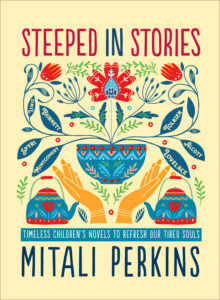 Steeped in Stories: Timeless Children’s Novels to Refresh Our Tired Souls Matali Perkins (Broadleaf Books) $24.99 OUR SALE PRICE = $19.99
Steeped in Stories: Timeless Children’s Novels to Refresh Our Tired Souls Matali Perkins (Broadleaf Books) $24.99 OUR SALE PRICE = $19.99
We love books about books and we love books about kids books. There are several (and we are glad we saw this year the re-printing of the fabulously interesting, if a bit weird, Pipers at the Gates of Dawn: The Wisdom of Children’s Literature by Jonathan Cott from the University of Minnesota Press.) More inspiring and fully wonderful, though, is what is, for now, at least, the best book I’ve read about children’s literature. Steeped in Stories is fabulous!
We admire the fictional work of award winning Metali Perkins very much and we are delighted that she here shares some of her own understandings of the role of stories in children’s moral and faith formation and what is going on is so many of the best youth books these days. (And she offers some warnings, too, which are helpful and wise.) We are glad for Broadleaf doing this in the nice, compact hardback format — what a great book it is. We hope this shout-out inspires many to buy it, as it is simply a must-read for parents, school educators, Sunday school teachers, curriculum writers, fiction fans, maybe even sharp teens. Steeped in Stories is a timeless winner!
Mitali Perkins’s winsome way with words seeps through every page of this useful guide that’s so much more than a guide. Her love of classic writing, even with all its flaws, serves as a compass for us to navigate the ins and outs of timeless stories so that they do more than entertain our modern craving for amusement. — Tsh Oxenreider, author of At Home in the World and Shadow and Light
Steeped in Stories is a timely exploration of timeless classics, clear-eyed about cultural blind spots, yet still enchanted by the wisdom, beauty, and wonder of these marvelous stories. This is one of the most brilliant guides to children’s literature I’ve read. — Karen Swallow Prior, professor and author of On Reading Well: Finding the Good Life through Great Books
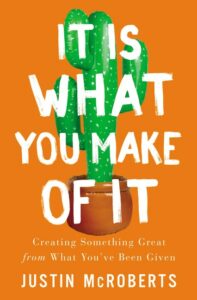 It Is What You Make of It: Creating Something Great from What You’ve Been Given Justin McRoberts (Thomas Nelson) $18.99 OUR SALE PRICE = $15.19
It Is What You Make of It: Creating Something Great from What You’ve Been Given Justin McRoberts (Thomas Nelson) $18.99 OUR SALE PRICE = $15.19
As I thought back over last year, I immediately thought of how much I enjoyed this easy to read, entertaining and inspiring book. I devoured it. The author is a friend and I admire him a lot so, of course, wanted to read it right away. And while I try to use a few colorful Ines here in my writing (and some might say our whole entrepreneurial thing, here, indicates some sort of maker inclinations) I don’t view myself as a creative type. A “creative” (in the noun, form, as the kids do today.) And — hey, hey —It is What You MakeIt was a book I very much needed to read.
I was going to list this as a Best of 2012 in the “personal growth” category, and I suppose I should have. The others there were characterized, mostly, by coping with pain, about thriving amidst difficulties; that is, they were rather psychological in nature. This is more about being creative and “making something” of whatever you are given (I now cringe every time I hear myself saying, “it is what it is” since he teaches us why that is not so.) But, still, I didn’t want to list this with more directly artistic books, either. Justin is a singer-songwriter and record producer (he just did a kids’ album!) but this book about taking risks to exercise our God-given capacities to make a good life and make a difference, so it is not just for aspiring artists.
So here it is, listed, for better or worse, under popular culture. He did have an air-guitar KISS band as a kid, and he did play and sing — it’s a great story — with the loud punky ska band Five Iron Frenzy on tour for a while.There’s a story about a failure of a gig (or was it) in far-away Edmonton, Canada. And he talks about the band Primas, for crying out loud. Where else would I list this book?
This is a book about recognizing our gifts, using our resources, accepting the collaboration with others who God brings into our lives and sharing our time and taken with others. There are, as the back cover says, “hilariously relatable anecdotes and antics.” Indeed. There’s Bible study, thoughtful exercises, and a upbeat call to get serious with our lives and make something of our communities, our faith.
And, as a bonus, It Is What You Make of It gets an award for the worst cover of 2021 until you read the book to explain what the goofy cactus is all about. And then — bingo — it’s one of the best covers of 2021 once you know what it’s all about. It’s worth the couple of bucks for the book just for that story that explains, well, just about everything.
PUBLIC AFFAIRS / CIVIC CULTURE
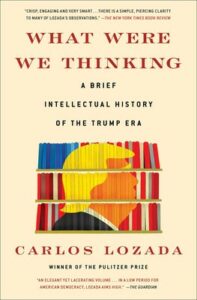 What Were We Thinking: A Brief Intellectual History of the Trump Era Carlos Lozada (Simon & Schuster) $17.00 OUR SALE PRICE = $13.60
What Were We Thinking: A Brief Intellectual History of the Trump Era Carlos Lozada (Simon & Schuster) $17.00 OUR SALE PRICE = $13.60
Since I have a lot of favorite books in this area, I have to be brief. I will say this: I have read a lot and there are excellent reports of our political life these past years. I was glued to several unbelievable books about the former Presidents last crazy months, from Peril by the famous Woodward to Michael Wolff’s third volume on the Trump years, Landslide. Yes, things were weird.
What Were We Thinking, though, is not a behind the scenes accounting; it is not investigative journalism or grandstanding. It is a very sober-minded, nicely written, wise, even, survey of the books about Trump and Trumpism. The author tells us in the beginning how many books about the former President and his administration and the 2016 elections he has read and reviewed (he is a Pulitzer Prize winning book critic for the Washington Post.) Lozado knows the lay of the land, the pro and con arguments, the sassy ones, the fair-minded ones, the ones that focus on race or economics or the carnage of the rust-belt or the evangelicals or whatever. There are books documenting the famously (and simply non deniable) over-the-top dishonesty of the President and his spokespeople and the incredibly sloppy know-nothing zeal he revealed in. There are books that wonder why — who voted for him and what motivated them. He has studied them all. Which is to say, he knows the books, has seen the coverage, has explored the political, cultural, and philosophical thinking behind it all and give us here a wonderful survey of the gist of so much conversation. As the New York Times review put it, “There is a simple, piercing clarity to many of Lozada’s observations.”
I do not want to overstate this, but I have read some and are familiar with many of the 150 books referenced here and I am glad for some that he picked (including, for instance Alienated America: Why Some Places Thrive While Others Collapse by Timothy Carney) and I appreciate his weaving their various points of view and insights into some key principles and takeaways.
Granted, as one person noted, it is “an irony of our age that a man who rarely reads has unleashed an onslaught of books about his tenure and his time.”
I appreciate that Mr. Lozada is less impressed with polemics and those that sound more “righteous than right.” So here is his provocative argument, that I found award-winning:
Whether written by liberals or conservatives, activists or academics, true believers or harsh critics, the books of Trump’s America are vulnerable to the same failures of the imagination that gave us this presidency in the first place.
I loved this real-time intellectual history of our time. As the LA Times put it, “the meta Trump book you didn’t know you needed (and wanted) to read.” Ha! So meta, so 2021.
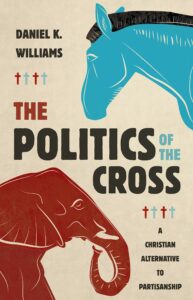 The Politics of the Cross: A Christian Alternative to Partisanship Daniel K. Williams (Eerdmans) $27.00 OUR SALE PRICE = $21.60
The Politics of the Cross: A Christian Alternative to Partisanship Daniel K. Williams (Eerdmans) $27.00 OUR SALE PRICE = $21.60
I have written much about a distinctive, Biblically-wise, multi-faceted view of politics and government and have often suggested that Christian people who want to honor the Lordship of Christ over all of life, including our citizenship, would be well to not primarily seem overly loyal to one ideological camp or political party. It may be idealist to talk about a “third way but surely Tony Evans was write when he preached that when Jesus returns he will not be riding a donkey or an elephant. We should be more interested as one group I admire puts it, in principles before parties. You can see some of those lists HERE or HERE
And so, I’ve offered book lists and review that help us nurture our uniquely Christian mind about law and politics and that offer non-partisan guidance on citizenship. This book, out in 2021, could have fit in any number of those previous lists. It is exactly about that very thing by a wonderfully serious Bible guy, helping us all get beyond the inane partisanship (as Thomas Kidd called it) that characterizes American political life. As he said, if you aren’t interested in getting to a better place, then The Politics of the Cross is not for you.
You can read my longer review at the BookNotes archives, but why not just order it now? You can rejoice that authors as diverse as John Fea Kelly Kapic and Collin Hansen all raved about this. In any case, this was a favorite book of mine this year for its sheer audacious hope that we might take Jesus seriously in our relationship to what seems to be mostly a two-party system, without falling to far off the gospel rails, one side or the other. You will learn much, you will be inspired, and maybe you, too, will be encouraged. I sure was.
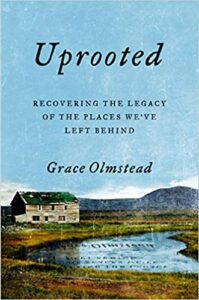 Uprooted: Recovering the Legacy of the Places We’ve Left Behind Grace Olmstead (Sentinel) $27.00. OUR SALE PRICE = $21.60
Uprooted: Recovering the Legacy of the Places We’ve Left Behind Grace Olmstead (Sentinel) $27.00. OUR SALE PRICE = $21.60
Grace Olmstead’s very good book was one of my favorite favorites all year because it was so gorgeously written, it evoked such a sense of place, it was honest about the implications of caring about “the places we’ve left behind.”I introduced it and raved a bit and invited folks to buy it. It is published by a conservative publishing house and promoted mostly by a network of sharp folks that years ago were called “crunchy cons” — conservatives who care about traditional values, localism, caring for the land (but conservation into the conservative lexicon) — not mostly economic growth or giving big business a pass when they egregiously pollute or disrupt. These folks who talk about a “front porch republic” know as much about Wendell Berry as de Tocqueville and are more interested in a life well lived than winning hot-button issues of the culture wars. I might not have realized that this is the ethos surrounding much of this book, and it doesn’t matter, really: it’s a darn good read and will be engaging for anyone who cares about our civic life, our social fabric, our roots, our parents and children, if we have children.
Read my review at our BookNotes archives but, to be honest, read this review of Uprooted by Valeri Weaver-Zercher that was published in the Christian Century. Valerie is one of my favorite book reviewers and I’d like to award this review of hers as my favorite book review of the year. But, of course, it is based on an amazing book, one of the best of 2021.
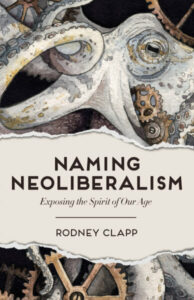 Naming Neoliberalism: Exposing the Spirit of Our Age Rodney Clapp (Fortress Press) $24.00 OUR SALE PRICE = $19.20
Naming Neoliberalism: Exposing the Spirit of Our Age Rodney Clapp (Fortress Press) $24.00 OUR SALE PRICE = $19.20
I am a sucker for big picture social critiques, authors naming the spirit of the age like some Hebrew prophet. From audacious, large scale analysis of genius like McGilchrist’s The Master and His Emissary: The Divided Brain and the Making of the Western World to Brian McLaren’s Everything Must Change: When the World’s Biggest Problems and Jesus’ Good News Collide to the amazing (must-read!) Beyond Homelessness: Christian Faith in a Culture of Displacement by Steven Bouma-Prediger & Brain Walsh to Bob Goudzwaard & Craig Bartholomew’s Beyond the Modern Age: An Archaeology of Contemporary Culture. I suppose it is why we awarded as a Best Book of 2021 (in Part One of this BookNotes list) The 1619 Project, which is nothing if not sweeping. I think it was Francis Schaeffer who once said we sometimes need to turn from the microscope and pick up the telescope for a wider-lens view.
And so, in that spirit, and to that end, we are eager to award Rodney Clapp’s Naming Neoliberalism: Exposing the Spirit of Our Age a Best Book of the Year, honoring him for this careful, studious, detailed study of what is mean by Neo-liberalism and how that phrase captures so much of our contemporary ideologies and so much of what is bringing turmoil to our world. And it is well deserving of our celebrations for the contributions Clapp makes not only to our big-picture and behind the scenes understanding, but in his lively invitation to do something about it; to live by a different story, catechized into an alternative world by the church of Jesus Christ. Thanks be to God.
In my feeble efforts to review this at BookNotes last summer, I was buoyed by the great endorsements that others wise than I have offered:
Rarely are critiques of neoliberalism followed by beautiful, constructive proposals for alternative ways to live. By giving us both, Clapp offers this book as a gift to the church. The converse is also true: it is important not only to identify the life-affirming work churches are called to do but also to help congregations name and understand the dominating power of our age. Only when we are clear about what the gospel frees us from and frees us for, Clapp well argues, may the church be a relevant witness against the power and principality of neoliberalism that opposes God’s reign. — Jennifer M. McBride, author Radical Discipleship: A Liturgical Politics of the Gospel, professor of theology and ethics, McCormick Theological Seminary
This concise and accessible analysis takes us beneath the fear, inequality, war, hunger, and environmental devastation of the present age and shows us how they operate. Rodney Clapp unpacks the ideologies that try to convince us that the world must be so, and then offers resources from the Christian tradition to enact a more livable world. No one is more skilled at bridging the scholarly and pastoral contexts than Rodney Clapp. –William T. Cavanaugh,DePaul University
Lillian Daniel, senior pastor of First Congregational Church of Dubuque, Iowa and author of Tired of Apologizing for a Church I Don’t Belong To wrote honestly when she said: “Let’s be honest. As pastor of a politically split church, I am not looking for ways to introduce more politics into congregational life. In an age of tweets and squawking, I thirst for the Peace of Christ. But after reading Rodney Clapp’s Neoliberalism, I also see how hungry and lonely I have been, while wandering in this desert of culture wars, for some weight and wisdom from a spiritual tradition that is older, larger and deeper than I am. Somehow, Clapp uses a hot button topic to model how to have a cool Christian conversation, across the aisles of politics or pews. I would gladly introduce this book to my church members, for its sense of perspective but most of all for its contagious hope for a church where God is still speaking louder and more lovingly than the pundits.”
It may be a bit academic to give to everybody at your church, but I like Rev. Daniel’s optimism. Let’s do try to get this read and discussed. We need the big picture sometimes, the serious critique, and the viable vocabulary of faith as an alternative
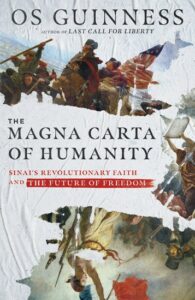 The Magna Carta of Humanity: Sinai’s Revolutionary Faith and the Future of Freedom Os Guinness (IVP) $25.00 OUR SALE PRICE = $20.00
The Magna Carta of Humanity: Sinai’s Revolutionary Faith and the Future of Freedom Os Guinness (IVP) $25.00 OUR SALE PRICE = $20.00
I have often said that as one of my personal heros and favorite authors I would read anything written by Dr. Os Guinness. Of course I say that about the breezy Anne Lamott and funny, blue-collar, farmer-pundit Michael Perry, too, although with them, the promise isn’t as daunting. Os, however, writes deeper, serious, and often challenging works, and, in this case, on a topic I am not naturally drawn to — the glories of the ideas behind the American Revolution. I’ve read Os on this before (such as his 2019 Last Call for Liberty) and heard him lecture about the ordered freedoms that the founders (despite their flaws) brought into the world in 1776.
I know Guinness’s work fairly well, having read most of his books more than once. I was not quite prepared for a few things in this magisterial, important work, The Magna Carta of Humanity. It wasn’t odd or alarming, but I’ve never recalled Os being so very passionate about Judaism, about Hebrew scholars, and about the extraordinary genius of one of the most significant public intellectuals of our times, the late Rabbi Lord Jonathan Sacks. I got tears in my eyes when Guinness (somewhat uncharacteristically, perhaps) shared how Sacks read the manuscript of Magna Carta and Guinness’s explication of the significance of the very idea of the Old Testament law, and how appreciative Os was that Sacks wrote back, even as he was ill. The revolutionary faith of “Sinai” in the subtitle is very significant and Guinness, always the teacher of important history, shows how the Hebrew worldview in many ways launched (and in some places critiqued) Greece and Rome, the medieval West, the British empire and, supremely, the American founders and framers and their revolution for a republic.
And, importantly, all of this is in contrast to the stream that moves from the French Revolution to Hitler and, more so, Stalin and Mao. How different were the bloodless English revolution and the American war against King George, offering the world a set of ideas that, if applied and nurtured, could offer the ordered freedom under law unlike anything the world had ever known.
Note the two pictures on the top and lower portion of the dust jack and realize they go with two dates — 1776 and 1789; those, in turn, go to the choice Sinai or Paris.
The Magna Carta of Humanity is worth reading just for Guinness’s reflections on the Old Testament and the legacy of Exodus. He shows the significant consequences of the notion of the covenant, about which his writing is outstanding. He knows the work of Tremper Longman, say, or John Goldingay, Chris Wright, Walter Brueggemann, John Walton, or other eminent Christian Old Testament scholars, but he is drawn to Abraham Heschel, Michael Walzer and Rabbi Sacks, to whom the book is dedicated. It makes for illuminating reading.
A second theme of the book you will have to discover and evaluate yourself; I am firstly celebrating it here, not offering my own critique which must come at another time. I will just say this: I do not fully agree with Dr. Guinness (and I shudder to find myself typing these words) about his assessment of the greater threat from the cultural left these days than from the revolutionary far right. I wished for more balance in his exposing the inconsistencies and dangers of progressive left. He, his wife, and son, have worked tirelessly for a better world and have consistently renounced racism and social injustices, as he does in this powerful book, and I do not in the least suggest otherwise. (Just read chapter 8 for a compelling, solid Biblical theology of justice, hospitality, mercy and homecoming.) His quick-fire points (10!) though, against critical race theory, say, or his rebuke of the secular and postmodern progressive left, left me with more questions than reassurance that he was fully on target. Why suggest that the left are “twitter Jacobins” and not fret about the threats of rape and murder some Christian feminists face there from “brothers” on the right? Talk about cancel culture? The right has been at it for decades, as he well knows, having been the target of cruel rebuke himself for his public affirmation of political pluralism. Referring to a “mob” on one (leftist) side while not using such language against those on the right, some of whom, well, read his books — indicates, I think, a shift in Os’s own thinking and analysis. (He says as much, by the way, in his recent foreword to the celebratory 2019 re-issue of The Dust of Death.)
One need not agree with every word of every book to honor it, to celebrate it, to say that it was a favorite read and to highly recommend it. I do not hesitate to honor and celebrate and recommend The Magna Carta of Humanity: Sinai’s Revolutionary Faith and the Future of Freedom by the exceedingly informative and regularly inspiring Os Guinness. Like I said — I’d 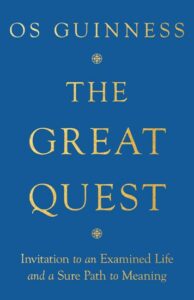 read anything he writes. Even if it pokes at my worldview a bit.
read anything he writes. Even if it pokes at my worldview a bit.
And next up, Dr. Guinness has a brand new release that arrived here early. I am thrilled! It is called The Great Quest: Invitation to an Examined Life and a Sure Path to Meaning (IVP; $16.00 – OUR SALE PRICE = $12.80.) I can assure you that it will be one of the great little books of 2022. Very impressive.
BIBLICAL STUDIES
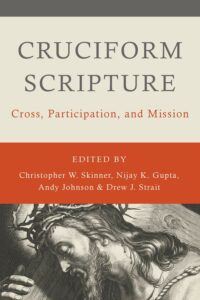 Cruciform Scripture: Cross, Participation and Mission edited by Christopher Skinner, Nijay Gupta, Andy Johnson, and Drew Strait. (Eerdmans) $35.00 OUR SALE PRICE = $28.00
Cruciform Scripture: Cross, Participation and Mission edited by Christopher Skinner, Nijay Gupta, Andy Johnson, and Drew Strait. (Eerdmans) $35.00 OUR SALE PRICE = $28.00
This is a book we are so glad to honor, happy to shout out about, naming it as a most significant book of 2021 for a few reasons. I think the major reason is because it is — without announcing it on the cover — a book in honor of the work fo our friend Michael Gorman. Mike was a Dean and know is a professor at Saint Mary’s Ecumenical Institute in Baltimore, and we admire the whole program there very, very much. Mike is well liked by all and really respected by those in the know, professional Bible scholars and ecumenical church leaders. He has written many books but a few he did on Paul’s view of what he calls “cruciformity” has been nearly revolutionary for some. This book is a collection of essays drawing on or interacting with his work. As such, it honors him — hooray! — and it serves the church by refining, more and more, what faithful theology and spiritually and discipleship looks like, inspiring by the cross of Christ. These essays are theological, cultural, a tad philosophical, even, but mostly Biblical. The editors, are all New Testament scholars and most of the chapters are either about the gospels or the epistles.
We celebrated this when it first came out earlier in the year and we are glad to add our little voice here in Dallastown to the chorus of others who have congratulated Dr. Gorman, and, especially, these scholars who put together this book in his honor, for the sake of God’s people who are called to serve the world. It is scholarship that matters and is a resource you should have on hand, read slowly, spend years, with, even. It’s that kind of volume.
Some of the important authors with fascinating insights include Dennis Edwards, Rebekah Eklund, Stephen Fowl, Richard Hays, Sylvia Keesmaat, Brent Laytham (who now serves as Dean at St. Mary’s), N.T. Wright, Patricia Fosarelli, and more.
Kind reviews on the back, encouraging folks to pick up and read these many pieces, are from Richard Bauckham (of the University of Cambridge), Douglas Campbell (of Duke Divinity School) and Scot McKnight, of Northern.
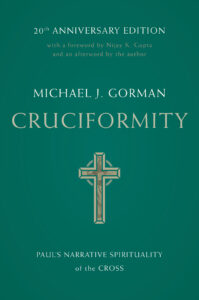 Cruciformity: Paul’s Narrative Spirituality of the Cross Michael J. Gorman (Eerdmans) $40.00 OUR SALE PRICE = $32.00
Cruciformity: Paul’s Narrative Spirituality of the Cross Michael J. Gorman (Eerdmans) $40.00 OUR SALE PRICE = $32.00
By the way, speaking of Best Books and celebrations and Dr. Michael Gorman: it was twenty years ago his profound and game-changing work Cruciformity: Paul’s Narrative Spirituality of the Cross came out. This past year, Eerdmans released an expanded edition, called the 20th Anniversary edition, with a new foreword by Nijay Gupta (which is fascinating) and a very lengthy new chapter by Gorman, giving a bit of the backstory to his work, how Cruciformity came about and how it was received, and some new updated of things he has considered since 2001 when the first edition came out. Certainly this new edition deserves a 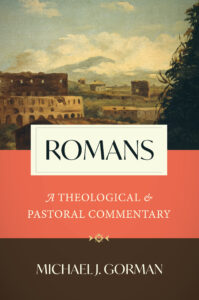 special place on any list of important books done in Biblical research this year.
special place on any list of important books done in Biblical research this year.
Head up, too: Gorman has a new commentary on Romans coming hopefully before the end of March 2022. Yes!! You could PRE ORDER that, here, too, at 20% off. It will be about 350 pages and will called Romans: A Theological & Pastoral Commentary Michael J.Gorman (Eerdmans) $39.00 OUR SALE PRE-ORDER PRICE = $31.20
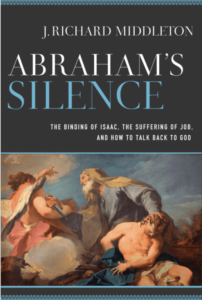 Abraham’s Silence: The Binding of Isaac, the Suffering of Job, and How to Talk Back to God J.Richard Middleton (Baker Academic) $26.99 OUR SALE PRICE = $21.59
Abraham’s Silence: The Binding of Isaac, the Suffering of Job, and How to Talk Back to God J.Richard Middleton (Baker Academic) $26.99 OUR SALE PRICE = $21.59
I reviewed this a bit at BookNotes and wish I had time to say more. This is certainly one of the most thought-provoking, stimulating, provocative books in many a year. Richard has been a friend of ours since his co-authoring (with Brian Walsh) The Transforming Vision and Truth is Stranger Than It Used To Be. He has spoken at the CCOs Jubilee conference, having shared there a keynote message from his brilliant book about Biblical eschatology (A New Heavens and a New Earth.) I have raved about his seminal work on the nature of what it means to be made in God’s image (The Liberated Image.) We here at Hearts & Minds are happy to recommend anything he writes.
This new one is serious and complex, but we can describe it simply: Middleton thinks that Abraham should have said no to God when God asked him to sacrifice his son. Drawing on the law and the prophets, wisdom literature and the lament Psalms, he makes a cogent case that God expected him to protest, not acquiesce. This is a deeply coherent argument rooted in the Bible itself, written by a respected Bible scholar and passionate Kingdom leader. Wow. It really could help you rethink a lot, being more faithful to the Scriptures, not less.
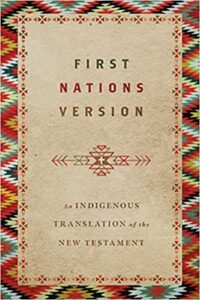 First Nations Version: An Indigenous Translation of the New Testament Terry Wildman and others (IVP) $20.00 paperback OUR SALE PRICE = $16.00
First Nations Version: An Indigenous Translation of the New Testament Terry Wildman and others (IVP) $20.00 paperback OUR SALE PRICE = $16.00
We were delighted that some of our customers bought this when it released in early September, and the publisher was glad to hear lots of good feedback, almost immediately. It was, apparently, more popular than anyone anticipated and appreciated greatly. As we’ve said, this is the fruit of a big project of several tribal leaders who are Bible scholars. It is thoughtful and intentional, rendering the ancient Greek into words, phrases, metaphors and images that ring true to the Candace and linguistic structure of indigenous people’s language. This is nothing odd — missionaries translate ancient Scripture into contextualized idiom all the time. Thanks be to God. I kept thinking I wondered what Eugene Peterson would have thought. Surely a publishing event of the year!(The hardback seems to be seriously confounded by international printing and supply chain issues. We can put you on a waiting list for that one if you want to wait; it goes for $35.00.)
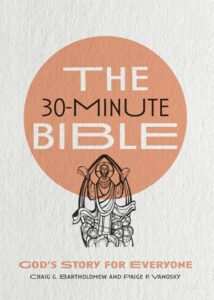 The 30-Minute Bible: God’s Story for Everyone Craig Bartholomew & Paige Vanosky with illustrations by Martin Erspamer (IVP) $17.00 OUR SALE PRICE = $13.60
The 30-Minute Bible: God’s Story for Everyone Craig Bartholomew & Paige Vanosky with illustrations by Martin Erspamer (IVP) $17.00 OUR SALE PRICE = $13.60
I have a handful of short, readable, wise, insightful introductions to the Bible. This is a real winner, one of the very best, by a author who has done worldview-ish, insightful Biblical overviews and a woman who has taught big picture Bible classes for years. Together they have given us a short reading about every key moment in the Bible, a fabulous, handsome, small, spot-on way to dip in briefly and get the whole story in 30 readings. They say 30-minutes a day, but you could do this in considerable less time than that. A gem. Buy a bunch!
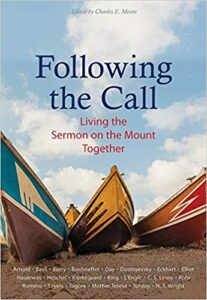 Following the Call: Living the Sermon on the Mount Together edited by Charles Moore (Plough Publishing) $18.00 OUR SALE PRICE = $14.40
Following the Call: Living the Sermon on the Mount Together edited by Charles Moore (Plough Publishing) $18.00 OUR SALE PRICE = $14.40
I hope you know that we did a Facebook live event with Dr. Charles Moore and it was a bit intimidating — he is one of the most widely read people I have ever met — and a wonderful time of chatting with hundreds of people from around the world tuning in. This is very much like the equally potent Called to Community: The Life Jesus Wants for His People, also done by Plough, or, say, his exquisite anthologies Waiting for the Light and Bread and Wine. Yep, these are collections of the best reflections on the Sermon on the Mount from all sorts of writers from all sorts of social locations and theological traditions from throughout church history. Only Charles Moore could have pulled this off — entries from Bonhoeffer and Merton, Dorothy Day and Mother Teresa, Saint Benedict and Philip Yancey, Richard Foster, Dostoyevsky, Tolstoy, N.T. Wright, C.S. Lewis, Madeline L’Engle and one of his heros, Eberhard Arnold. What a book! Radical discipleship in community with other followers of Jesus never was unpacked with such depth and joy, clarity and provocation.
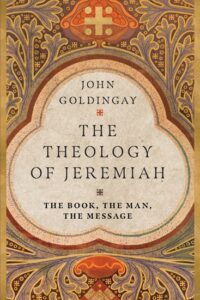 The Theology of Jeremiah: The Book, the Man, the Message John Goldingay (IVP Academic) $22.00 OUR SALE PRICE = $17.60 The New International Commentary on the Old Testament: The Book of Jeremiah John Goldingay (Eerdmans) $75.00 OUR SALE PRICE = $60.00
The Theology of Jeremiah: The Book, the Man, the Message John Goldingay (IVP Academic) $22.00 OUR SALE PRICE = $17.60 The New International Commentary on the Old Testament: The Book of Jeremiah John Goldingay (Eerdmans) $75.00 OUR SALE PRICE = $60.00
Yes, the good professor and prolific Bible scholar gets a double award here, a twice underlined accolade for two books on the same topic. One was released in January 2021 and the other in December, so, well, that just deserves to be noted as a charming bit of good fortune for a geeky bookseller like me or book buyer like you. Right? Golly, this guy is faster than his friend Tom Wright!
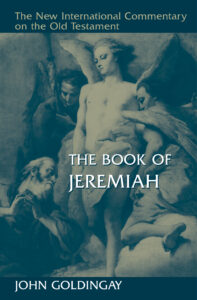 Seriously, for anyone who cares deeply about this extraordinary prophet who wept and dreamed and acted out his way into the Holy Scriptures as Jerusalem was crumbling around him before and during the awful deportation and destruction of 586, these two books are exceedingly valuable and a cause for rejoicing, even in our own sort of exile.
Seriously, for anyone who cares deeply about this extraordinary prophet who wept and dreamed and acted out his way into the Holy Scriptures as Jerusalem was crumbling around him before and during the awful deportation and destruction of 586, these two books are exceedingly valuable and a cause for rejoicing, even in our own sort of exile.
I heard a sermon or two as a young person on Jeremiah that influenced me for the course of my life, I think. I read a book about Jeremiah by James Sire maybe 40 years ago and that got me hooked. I’ve perused and borrowed from countless commentaries over the years — this shorter overview from IVP (The Theology of Jeremiah) is the one I was waiting for. The Eerdmans NICOT one (that is the one that is over 1000 pages), as many of our customers who use them know, is a bit over my pay grade. But it may be the definitive scholarly work at this point. (And, interestingly, since we’re honoring Goldingay’s notable output of late, he also just released in the first month of 2022 another serious NICOT volume, this one on Lamentations. Wow.) Two books, both very impressive.
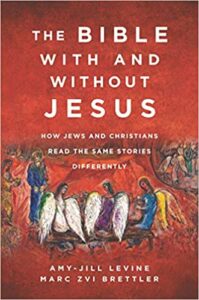 The Bible With and Without Jesus: How Jews and Christians Read the Same Stories Differently Amy-Jill Levine & Marc Zvi Brettler (HaperOne) $34.99 OUR SALE PRICE = $27.99
The Bible With and Without Jesus: How Jews and Christians Read the Same Stories Differently Amy-Jill Levine & Marc Zvi Brettler (HaperOne) $34.99 OUR SALE PRICE = $27.99
This who follow us here at BookNOtes know that we often announce the new books by Amy-Jill Levine. Having met her and sat under her mesmerizing, witty, righteous passion for the early church and the gospels they produced, I have ever since been eager to learn from a Jewish woman what she might say about our New Testament and our Savior. Often she is really, really good — and funny.
She is a good scholar, though, and she has done some hefty work that is important for Christians, especially. This 2021 one, co-written by her colleague Marc Zvi Brettler (who worked with her on the Oxford Jewish Annotated New Testament) is a book that deserves to be awarded as a major release this year. It is just that unique, that rare, a book that, upon hearing of it, I thought to myself “Why hasn’t anyone done that before.” Levine teaches at Vanderbilt and Brettler teaches at Duke; they are both beloved profs and exceptionally qualified to write about, at least, how Jews view their own texts. I have on occasion wondered why they didn’t bring a Christian Old Testament scholar on board with this, but I suppose that is part of the genius.
The book does exactly what it sets out to do. At almost 500 pages it is a major study. It is easy to follow, not arcane, and very informative. That it unlocks for us the reality of varying interpretive traditions, different communities of reading, is itself a great gift.
In an age where polemics and talking past one another is common, the appeal to respectful interpretation and dialogue is refreshing and helpful. Perhaps it is not too much to expect that we see ourselves as others see us or see our sacred texts as others see them. Highly recommended. — Dr. Ben Witherington, III, Asbury Theological Seminary
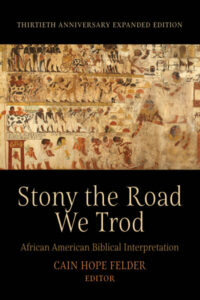 Stony the Road We Trod: African American Biblical Interpretation: Thirtieth Anniversary Expanded Edition edited by Cain Hope Felder (Fortress Press) $32.00 OUR SALE PRICE = $25.60
Stony the Road We Trod: African American Biblical Interpretation: Thirtieth Anniversary Expanded Edition edited by Cain Hope Felder (Fortress Press) $32.00 OUR SALE PRICE = $25.60
Just two years ago we raved about a new voice in the world of Biblical studies, a strong African American New Testament scholar at Wheaton who got his PhD in Scotland under N.T. Wright. Esau McCauley has become a major voice for serious conversations about race and racism in American evangelicalism, especially and his book Reading While Black seemed to open many readers to the ways in which social location — in this case, being black in America in the era of mass incarceration and BLM— might color how the Bible is read, understood, interpreted, preached, applied. Dr. McCauley, a historic black church guy who is now an Anglican, certainly (certainly) is not the first to develop a uniquely black hermeneutic but his wonderful book has been accesible and contemporary and mostly well received.
Stony the Road We Trod is one of the urtexts in this field, one of the remarkably formative scholarly, classics that we have carried since it came out 30 years ago. The back cover of this new, anniversary edition says it is the first volume to explore distinctly Black readings, and I’m not so sure of that. But it is the first major work, widely received in the broader Bible guild, and used in mainline Protestant seminaries, that not only gave voice to black hermeneutics and scholarship, but united rising Black scholars in the field in a seminal text. It represented a major window, what Jacquelyn Grant of the Interdenominational Theological Center called “a paradigm shift.” Gail Yea called is, rightly, “a landmark volume.”Others have called it “groundbreaking.”
And so we are glad to honor its significance, its heritage, and celebrate this new, re-issued, expanded hardcover edition. The long introduction to this30th Anniversary edition is by Brian K. Blount (now President of Union Theological Seminary in Richmond VA and Charlotte NC.) and is nearly worth the price of the book as he explores why there were not many black and brown PhD Biblical studies scholars even into the 1980s; he shows the background, importance, and the trajectory of Stony the Road. Other new chapters are included and some of the other original texts have been updated. This new volume is a major release of 2021 and we are pleased to name it here.
Just so you know (I’m sure most do, but figure this is a chance to note it) the title of this volume is a line from the poem “Lift Every Voice and Sing” by James Weldon Johnson, written in, I think, about 1900, then put to music and widely known as “The Black National Anthem.” Rev. Felder’s evocative use of this line says much. He died in 2019.
CHURCH LIFE
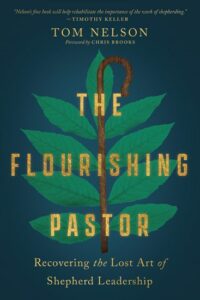 The Flourishing Pastor: Recovering the Lost Art of Shepherd Leadership Tom Nelson (IVP) $18.00 OUR SALE PRICE = $14.40
The Flourishing Pastor: Recovering the Lost Art of Shepherd Leadership Tom Nelson (IVP) $18.00 OUR SALE PRICE = $14.40
We have a lot of books about the vocation of being a pastor, the meaning of the role of the clergy, being a minister or priest. I read a good number of them, thinking of the men and women who I know who serve often under difficult conditions in the local church. I suppose you know the data showing how unhappy many, many clergy are, and I know you know the reports that in the last years, more and more have walked away from the calling and their churches. In many cases, it was a healthy thing to do. I do wish more read more books about the qualities of a good pastor and the characteristics of those that flourish. There’s a lot of good ones from many different angles.
I need not explain all the reasons, but it is my judgement that this is one of the very books books of this kind in many a year. I admire Tom, and I so respect his big picture of the Kingdom of God, networking church leaders for making a difference in the community. His “Made to Flourish” organization emerged out of his passion for thinking about work, Christianly, and realizing that much good that happens happens outside of the church doors as congregants are encouraged to relate Sunday worship to Monday work, so to speak.
If that is his expertise and good, Kingdom passion, helping people reflect on calling and career, vocation and work, what, then, might this have to say to those whose job is to be a minister, a preacher, a leader of the local Body? The Flourishing Pastor really is wise and emerges not only from Tom’s acute insight into the Bible and the theology of the shepherd leader, but also from his passion for thinking about sustainable and meaningful work stewarding our callings well.
Here is how the publisher pitches it; I think this is award-winning stuff:
With the risk of burnout at an all-time high, pastors need a new framework for ministry that will help them move from survival to flourishing. Drawing on the image of the shepherd leader, Tom Nelson offers pastors wisdom and timely vision for leadership that integrates in-depth biblical teaching and whole-life discipleship, providing a roadmap for ministry resilience and longevity.
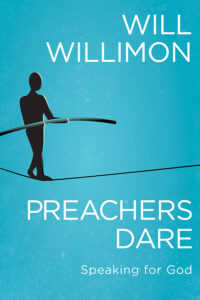 Preachers Dare: Speaking for God Will Willimon (Abingdon Press) $19.99 OUR SALE PRICE = $15.99
Preachers Dare: Speaking for God Will Willimon (Abingdon Press) $19.99 OUR SALE PRICE = $15.99
Some of the books on preaching that I have enjoyed the most — I know, it’s a weird hobby, reading books like this — have been those that are from many who give the annual Lyman Beecher Lectures on Preaching at Yale. I will never forget reading several in a row, thinking they were some of the most interesting books on preaching I had read.
Preachers Dare is adapted from Will Willimon’s Beecher Lectures and is inspired by a quote from the great theologian Karl Barth.
Here is how the publisher tells it:
In a world in which sermons too often become hackneyed conventional wisdom or tame common sense, preachers dare to speak about the God who speaks to us as Jesus Christ. Willimon draws upon his decades of preaching, as well as his many books on the practice of homiletics, to present a bold theology of preaching. This work emphasizes preaching as a distinctively theological endeavor that begins with and is enabled by God. God speaks, preachers dare to speak the speech of God, and the church dares to listen. By moving from the biblical text to the contemporary context, preachers dare to speak up for God so that God might speak today. With fresh biblical insights, creativity and pointed humor, Willimon gives today’s preachers and congregations encouragement to speak with the God who has so graciously and effusively spoken to us.
Willimon is world renowned, of course, and has written many other books on preaching (and more than one on Barth.) I’ve crossed paths with him at a workship here in Dallastown, believe it or not, and as a keynote speaker years ago at our Jubilee conference in Pittsburgh. I’ve admired him, disagreed with him, thought he was too understated, at times, and yet, he is one of our finest theological voices for church life today. And this great book says why.
I think, for the record, the cover is beyond cheesy and such a fine work from a prestigious lectureship deserves better. Don’t let it fool you — this is one of the best books of the year.
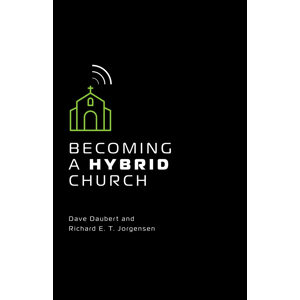 Becoming a Hybrid Church Dave Daubert & Richard Jorgensen (Day 8 Strategies) $11.99. OUR SALE PRICE = $9.59
Becoming a Hybrid Church Dave Daubert & Richard Jorgensen (Day 8 Strategies) $11.99. OUR SALE PRICE = $9.59
There have been a flurry of books about doing church amidst the pandemic, offering insight and guidance about virtual church during a time of quarantining and social distancing. Some are fine, offering common sense and helpful reminds.Others are more meeting, like the excellent and provocative Managing Congregations in a Virtual Age by John Wimberly, Jr. (Fortress Press; $20.00.) This one, though, Becoming a Hybrid Church, written, admittedly, by two friends of ours (one a neighbor and favorite regular here at the shop) is the best of ‘em all. It is short, necessarily concise, clear-headed and yet, oddly visionary. And it reminds us of very important things that some of us still need to hear. (We don’t “watch” worship on line, we participate, even if not person-to-person.) Our descriptions and word choices matter, our policy discussion must be discerned in light of not only congregational needs but the common good, and, sorry, but this thing isn’t going away. Being hybrid is now, for better or worse, a thing.
These two ecumenical leaders — one a wise and earthy church consultant from the Midwest, the other a central PA ELCA staff member for the Synod — know how to help us all get serious and remain faithful, even energized, about the new possibilities God is doing among us. Get a few of these and share them with your congregational leaders.
Here is how they describe it, which says it well:
As we adjust to a new reality, every congregation will need to find ways to continue on-the-ground ministry while also finding ways to use the online world in new and creative ways. Using an adaptive framework to start reflecting on these changes, the book’s concise chapters cover a variety of congregational ministries (worship, servanthood, congregational care, stewardship, spiritual formation and more) that are enhanced when congregations include online ministry in addition to working in more traditional ways. Each chapter includes a closing section with scripture, questions for reflection and a prayer that make it the perfect book for small groups, leadership teams and anyone who wants to think about what the next chapter looks like in the congregation where they are.
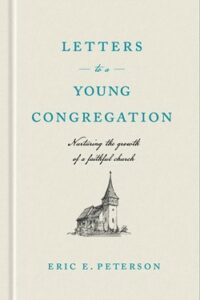 Letters to a Young Congregation: Nurturing the Growth of a Faithful Church Eric E. Peterson (NavPress) $19.99 OUR SALE PRICE = $15.99
Letters to a Young Congregation: Nurturing the Growth of a Faithful Church Eric E. Peterson (NavPress) $19.99 OUR SALE PRICE = $15.99
I have reviewed this before and wondered if my highlighting did it justice. It is a very wise book, a delight to read, just so well done — interesting, faithful, and full of wisdom from a seasoned (perhaps beyond his years) Presbyterian pastor. This is a set of letters to his church and you can read it as inspiration for your own church, learning a bit of “looking over his shoulder” wisdom, almost like a memoir unfolding, of his own pastoral work. (Think of Winn Collier’s fabulous novel in letters, Love Big, Be Well: Letters to a Small Town Church; this is sort of a real life version of that, minus most of the fictional drama.) In a way, this is a very good way to learn, not shaddowing, exactly, but a honest-to-goodness glimpse. I liked it just because it was so interesting to me, so nicely penned, but I commend it because you really could learn a lot from Pastor Eric.
Eric Peterson (I might as well say it) is the ordained Presbyterian son of Eugene and Jan Peterson, brother of a brother who is a novelist and poet and of a sister who is an artist. No wonder this pastor can turn letter-writing to his congregation into an art form.
For some reason, even in this season of pandemic and sadness, and maybe, soon, fresh starts, Letters to a Young Congregation seems spot on. Congrats to Eric for such a fine, edifying, even entertaining book that strikes me as at once reasonable and radical. Read it to find out what I mean.
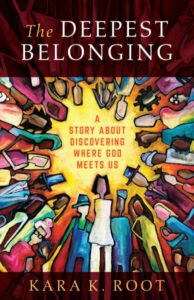 The Deepest Belonging: A Story About Discovering Where God Meets Us Kara K. Root (Fortress Press) $21.00OUR SALE PRICE = $16.80
The Deepest Belonging: A Story About Discovering Where God Meets Us Kara K. Root (Fortress Press) $21.00OUR SALE PRICE = $16.80
This is another book about congregational life, about the story of a church, written by a Presbyterian pastor, but it is not a “how to” book about being a clergy, or even guidelines for being a more effective or faithful church. It is more like a memoir, a narrative, a story. Actually it tells three interlocking stories.On the back cover, in larger print, is asks, “What is church for? What is a pastor? What does it mean to be truly human?”
Kara Root’s vision of faith, we learn right away, is rooted in “joy, freedom, and trust.” And, as they say, The Deepest Belonging “invites readers to walk through surprising doorways — weakness, vulnerability, smallness, rest, and honesty — into a new perspective of the Christian life and the role of the pastor.”
I highlighted this at BookNotes more than a year ago and I want to honor it here, now, as one of the most engaging, warm, provocative, and even luminous books of this kind I have read in ages. I am sure, before, I quoted some of those who rave about its on the back. It seems a good way to celebrate the importance of this book and honor its growing reputation as a very important volume.
This is simply the best book of Christian faith I’ve read in over a decade. — Mark Yaconelli, executive director of The Hearth, author of The Gift of Hard Things
Kara Root has an exquisite gift for paying attention and then speaking what she sees, showing us along the way that there is sacrament in the telling of our stories. — Jan Richardson, author of Sparrow: A Book of Life and Death and Life
Quicksilver smart, deeply honest, and blessed with a gift for language, Root invites us all into a deeper exploration of our faith. — Thomas G. Long, Candler School of Theology, Emory University
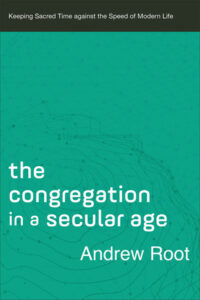 The Congregation in a Secular Age: Keeping Sacred Time Against the Speed of Modern Life Andrew Root (Baker Academic) $26.99 OUR SALE PRICE = $21.59
The Congregation in a Secular Age: Keeping Sacred Time Against the Speed of Modern Life Andrew Root (Baker Academic) $26.99 OUR SALE PRICE = $21.59
These days I am almost tired of people writing about the magisterial (if notoriously dense) philosophy of Charles Taylor and his seminal The Secular Age. I value those who have drawn on him — Jamie Smith’s must-read How (Not) To Be Secular: Reading Charles Taylor, the easy-to-understand chapter on Taylor in Tim Keller’s small Preaching, even Alan Noble (Disruptive Witness) and Jake Meador (In Search of the Common Good.) And, my favorite — the heady but captivating, How to Survive the Apocalypse: Zombies, Cylons, Faith, and Politics at the End of the World by Rob Joustra and Alissa Wilkinson.
Of all of these, there are three more that are, in my view, essential for modern church leaders and these are the ones that make up the trio by the always insightful (who just keeps getting better and better) Andrew Root. Although one does not necessarily have to read them all or in order (there, I gave you permission), the first (released in the fall of 2017) was Faith Formation in a Secular Age: Responding to the Church’s Obsession with Youthfulness; the second volume was released in 2019, The Pastor in a Secular Age: Ministry to People Who No Longer Need a God. (What a title, eh?) The final volume in the trilogy released early in 2021 and is very, very important. The Congregation in a Secular Age: Keeping Sacred Time Against the Speed of Modern Life
Yes, he cites Taylor and talks about the cross-pressures of late modernity. (And, he notes, with some concern, that the calls for change in the church often collude with the constantly accelerated lives demanded by our era.) This book, which shows how to move “from relevance to resonance” starts not only with a solid bit of cultural analysis, but examines “congregational despondency.” One of the great realities of our times, he notes, is “depressed congregations.” (Even, I might add, those that are quite zippy and exceedingly busy with the 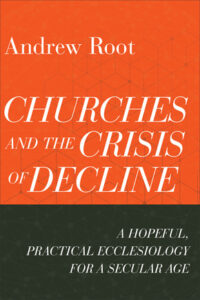 Lord’s work.)
Lord’s work.)
Kudos to the hard working prof (at Luther Seminary in St. Paul) and to Baker Academic for doing this sort of amazing, fruitful work.
By the way, we just got yet another book by Andrew Root that is said to be a fourth in this series, although it can read as a stand-alone title, Churches and the Crisis of Decline: A Hopeful, Practical Ecclesiology for a Secular Age (Baker Academic; $27.99OUR SALE PRICE = $22.39.) We might as well just say right now that this will be on next year’s list — it looks remarkable.
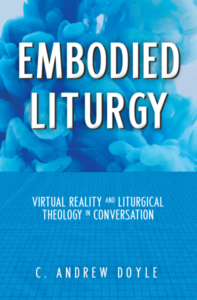 Embodied Liturgy: Virtual Reality and Liturgical Theology in Conversation C. Andrew Doyle (Church Publishing) $24.95 OUR SALE PRICE = $19.96
Embodied Liturgy: Virtual Reality and Liturgical Theology in Conversation C. Andrew Doyle (Church Publishing) $24.95 OUR SALE PRICE = $19.96
In just under 150 pages, and with a bunch of really fascinating footnotes, C. Andrew Doyle (an Episcopal bishop in Texas) has given us what seems to me to be the best (and, to be honest just about the only) substantive study of virtual reality and liturgy, which (of course) for Episcopalians and Anglicans — not to mention others of us — includes Eucharist. Doyle argues that the Eucharist is not a formulaic rehearsal of words and rituals but an “embodied and lived experience that requires a shared place and presence.” Of course, “the context of the ritual — with people, objects, words, and all sorts of nuance — creates intimacy with God and each other.”
I want to be clear that this is not primarily about the necessary practices of the hybrid church because of the still-spreading pandemic virus. It is not, nor is my recommending it, weighing in on the firestorm from Tish Warren’s unfortunately worded New York Times piece. (I wonder if she drew on this very book in her own ruminations?) I am not sure I agree with all of this (and, to be honest, I’m not sure I understand all of it, given my limits of understanding of semiotics and Anglican sacramental spirituality and eucharistic theology.
Agree or not, realizing it is about the digital age and the meaning-making going on in virtual reality, and not about pandemic protocols or public health concerns, Embodied Liturgy is nothing short of brilliant. As Ian Markham says, “The scope of the argument is breathtaking.” The Rev. Dr. Kate Sonderegger notes that Doyle “has brought the full compass of contemporary thought to bear on the controverted question of virtual Eucharist.”
Another review notes that, “Andy Doyle approaches the question with the same dignity and care to which he calls any who would dare to engage in deeper conversation about this complex and at times emotionally charged topic.” I liked the phrase that one supporter used saying the book offers a “generous intellectual landscape.”
This may be a serious, landmark Anglican text, but those of us from other Christian denominations and faith traditions should listen in; indeed, we are all “language making” creatures and we all form liturgy of some sort. Embodied Liturgy is important and a good example of how to ponder theologically the ideas and the practices that makes up much of our lives: worship and communion.
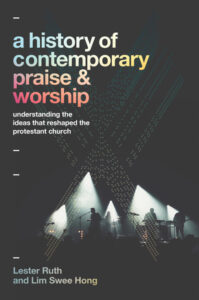 A History of Contemporary Praise and Worship: Understanding the Ideas That Reshaped the Protestant Church Lester Ruth & Lim Swee Hong (Baker Academic) $44.99 OUR SALE PRICE = $35.99
A History of Contemporary Praise and Worship: Understanding the Ideas That Reshaped the Protestant Church Lester Ruth & Lim Swee Hong (Baker Academic) $44.99 OUR SALE PRICE = $35.99
I have had a few intellectual mentors even if I suspect they’d say that wasn’t so, as I didn’t offer them the rapt attention they deserved. One was a Dutch neo-Calvinist that studied philosophy under Herman Dooyeweerd in Amsterdam; R.C. Sproul was a youngish “old Princeton” Calvinist who was, to my ears, just about the smartest person I ever met. I had a college prof who was important to me — he taught geography —and I eventually read authors like James Sire and his books on the mind of Christ. All said, emphatically, that whenever one is seriously approaching a topic it is important to study the history and development of that topic. To have true insight and a solid analysis of something going on, one must know the context, which includes the rise and influence of the ideas and forces that shaped it. We don’t sell many books on the history of this or that here at the store, but when I notice an astute one, my heart pounds a little.
My heart pounded lot when I heard about this, even more when I first saw it earlier this year — a solid, serious hardback. And then I sighed, worried that those who need this most, to understand the background and history of contemporary praise and worship as it is often understood (by those who approve and those who do not) and practice it, will be unlikely to shell out this much for a complex, if exciting, account of this topic as it developed in the past 50 some years or so.
It is simply astonishing that a book like this, rich and wise and detailed and interesting, has not yet been done. (And there are some that attempt this, or that do it in bits and pieces. These two authors, in fact, have a rough guide from about five years ago called Lovin’ on Jesus: A Concise History of Contemporary Worship that was published by Abingdon Press.)
A History of Contemporary Praise and Worship, in all 345 pages, does what no book has done and we commend it heartily. As my old influencers said, knowing the history of things that have reshaped our world, for better or for worse, is the first major step of being wise. The book is, by all accounts, the most comprehensive account yet given of the history of the development of “the liturgical forms that reshaped the landscape of Christian worship.”
The story is fascinating, starting in 1946 and quickly moving into the era 1965 – 1985. The two largest units are on “praise and worship” and “contemporary worship” and the final section explored the late 1990’s “new normal” and the confluence of the two.
Lester Ruth got his PhD from the University of Notre Dame and is now a research professor of Christian Worship at Duke Divinity School. Lim See Hong, who is native to Singapore is a Professor of Sacred Music at Emmanuel College of Victoria University at the University of Toronto.They are both astute, Godly, lively scholars and practitioners who care about the health of God’s diverse people in Christ’s diverse church.
Listen to Melanie Ross, who grew up in an evangelical church doing music ministry and now teaches liturgics at Yale Divinity School; she has written books comparing and contrasting the liturgy, music, and worship in several nondenominational/free churches and higher-liturgical congregations. She knows much about all of this and she extols the book, saying:
The story of Contemporary Praise & Worship is fascinating and complex, and Ruth and Lim follow its twists and turns with historical precision, theological sophistication, and wondrous clarity. This book is a remarkable achievement. It will remain the standard work of reference on evangelical and Pentecostal worship for years to come.
And listen carefully to John Witvliet of the beloved Calvin Institute on Christian Worship in Grand Rapids, who is always worth listening to:
What a remarkably rich and thought-provoking account of the people and the convictions that have directly or indirectly shaped the worship practices of millions of Christians in several quite different traditions. Those who remember the people or events described here may well be astonished to see the contours of the larger story in which they played a part. This is a book that will help us slow down and listen attentively, a crucial task for anyone who is called to discern the nature of vital, faithful worship practices in the years to come, including Christians from traditions that seem at first not to be influenced by the worlds described here.
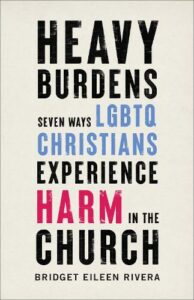 Heavy Burdens: Seven Ways LGBTQ Christians Experience Harm in the Church Bridget Eileen Rivera (Brazos Press) $19.99 OUR SALE PRICE = $15.99
Heavy Burdens: Seven Ways LGBTQ Christians Experience Harm in the Church Bridget Eileen Rivera (Brazos Press) $19.99 OUR SALE PRICE = $15.99
I hope you saw this in a previous BookNotes when I noted how very, very important I think it is. I think back to what I recall is the third gay person that I ever met (that I knew, of course), an upperclassman at my college and a devout, seemingly admirable Christian. He took his own life shortly after speaking with me, before “coming out” was a phrase I knew — why did he tell me, I wondered? And why would someone feel so badly about any troubles in their life to be driven to such a tragic outcome.
I have in one stumbling step after another tried to understand question that for almost 50 years; I have talked with many LGBTQ persons, read tons of books, and continue to worry that religion would ever be damaging thing to anyone. The “heavy burdens” in the title of this book comes from Jesus’s own warnings, of course, so, obviously, this book is urgent for anyone who is serious about not doing what Jesus warned about. We dare not weigh people down the way the Pharisees of old did. This author, by the way, is not fully prepared to fully embrace the open and affirming motto, and stands by fairly conventional sexual ethics. But she knows the heavy burdens, the way LGBTQ Christians have been hurt, have been harmed.
I think this is a very, very important book and while it is surely not the only thing that needs saying these days, it is one of the most urgent. Perhaps it will save a life of an excluded and shamed young person, and, if those who are habitually hurtful learn to repent, it might save their very souls.This is a study we need and advice we need to heed.
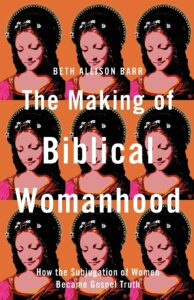 The Making of Biblical Womanhood: How the Subjugation of Woman Became Gospel Truth Beth Allison Barr (Brazos Press) $19.99 OUR SALE PRICE = $15.99
The Making of Biblical Womanhood: How the Subjugation of Woman Became Gospel Truth Beth Allison Barr (Brazos Press) $19.99 OUR SALE PRICE = $15.99
I suppose this could be listed under “Biblical studies” as well — the author offers lots of reflections on how Biblical texts are understood in different kinds of faith traditions (and in different eras of church history, which is her main expertise.) I’ll honor it here under congregational life given the story of the authors church life and the discussion of various camps and movements within the religious landscape.
I think it was a few days before our shipment of these first arrive. I was reading an advanced copy the publisher had sent and Beth (Hearts & Minds Beth, that is) was listening to an interview with Beth Barr on NPR. She came to me to say how impressive it was and that she really wanted to see the book. I had the book in my hands and was about ready to tell her that I was very, very impressed, that she’d want to see it. We both became fans that day, and dug in, realizing she had quite a story to tell and the unique academic chops to tell it in a compelling way.
Dr. Barr was a Southern Baptist evangelical historical with a speciality in medieval studies. She knows how nuns and ordinary women — Catholic and Protestant — read the Bible and lived their lives down through church history. She knows that the recent lingo about “Biblical womanhood” is a fairly recent movement, and the Council of Biblical Manhood and Womanhood are not as simply Biblical as their supporters seem to suggest. Ends up, in great heartbreak, her husband lost his job as a church youth pastor because of his support of her resistance to the mistreatment of women. And so we begin again.
Here are some excepts of my much longer reviewed (paired with three other important words) from an early June BookNotes column.
No lesser a light than historian Kristin Kobes Du Mez of Calvin University thinks that with this book, The Making of Biblical Womanhood there could be a groundswell shift of views, a tipping point.
One can hope. And, taken alongside Du Mez’s own devastating historical critique (and the careful, irenic, and exceptionally sound Recovering from Biblical Manhood & Womanhood by Aimee Byrd) and a handful of other such texts, we might see an erosion of the unbiblical and hurtful hegemony of Christian patriarchal views and the other unfortunate social consequences that follow from them.
Professor Du Mez is right about Barr’s The Making of Biblical Womanhood. It is fervent and bold and, for those with ears to hear, very compelling. Dr. Barr is a clear and passionate writer whether she is telling her own story as a longstanding Southern Baptist Convention (SBC) wife of a youth pastor, driven from her beloved local congregation over her (and her husbands) honesty about their egalitarian convictions or her work in the academy as a respected medievalist. She can tell a convincing tale about the machinations of a local evangelical/fundamentalist church as well as she can inspire us with stories of empowered 12th century nuns who taught Scripture or late Middle Ages pastors whose wedding sermons (in Latin, of course) say little about gender roles (as do those pushing for so-called “Biblical” womanhood) but invite men and women to mutual submission as they both honor Christ alone.
The thesis of this passionate book is simple: a certain movement of mostly Reformed, often Baptist, theologians and popular writers who wrote the “Danvers Statement” and formed the “Council of Biblical Manhood and Womanhood” (John Piper, Wayne Grudem, Denny Burke, Kevin DeYoung, etc.) insist that they are right in teaching what Biblical womanhood and manhood is and it has created within evangelicalism a strict and harsh movement that has demeaned and hurt many. (And, for some, this male-centric worldview has propped up even a heretical view of the Trinity called “the eternal subjugation of the Son to the Father” showing how their social agenda about power and hierarchy has influenced even their view of God.) They say that this simply what the Bible really teaches and they run with it (with guys like John Piper instructing women who are at home when a mailman visits how to speak in a way that doesn’t deflate his masculine identity; I’m not making this up.)
As a historian, Barr shows that this late 20th century and early 21st century push-back against more egalitarian soundings within evangelicalism, is not in keeping with the beautiful orthodoxy of the best of church thinking down through the ages. She – perhaps inspired by Du Mez, but perhaps not – explains how this pitching of Christian patriarchy as “complementarianism” arose (as the back cover puts it) “from a series of clearly definable historical moments.”
As Scot McKnight (who says, “I could not put this book down!”) writes of it:
Barr’s careful historical examples drawn especially from medieval history hold together a brilliant, thunderous narrative that untells the complementarian narrative.
Beth Barr begins her story with her own inner anguish. It is her story to tell but she and her husband are increasingly out of synch with their strictly anti-feminist church body. It is painful. In these sorts of churches, a woman like her – with a PhD in theological history and a professor at a Christian university – dare not teach teen boys Sunday school. This obsession with one or two verses (misunderstood, many would say) of Saint Paul (while missing other clear texts) silencing women in church creates a fetish so odd that one of her late teen college kids sincerely asked if she had her lecture notes given in the university approved by her husband. She assured him her husband – who did not have a PhD in medieval history – had no desire or authority to do such a thing. The young man was appalled.
Also, there is very good (and lively) scholarship here. Professor Barr explores the Biblical texts and the history of their translation and interpretation. She shows how some women are “written out of” the English Bible – for instance, see her exploration of the infamous Junia vs Junias rendering of Romans 16:7 (and the question of what it means to consider her as one with the apostles.) Barr looks at specific Biblical texts, writes well as a historian about the early church, the pre-Reformation times, and Reformation era understandings of key texts. She shows that the road to what many now call “Biblical womanhood” is rooted in whole lot of very unique debates about specific Biblical subjects. It was fabulously interesting and added new levels of conviction and passion in me.
…for instance, Barr describes the backstory of those traditionalists who alleged that the use of gender inclusive language (that is, “humankind” instead of “mankind,” etc) of an updated NIV was driven by some compromising spirit of the age and which eventually lead to the formation of the ESV translation, done quite openly as an anti-feminist translation.
With chapters like “Sanctifying Subordination” and “Making Biblical Womanhood Gospel Truth” there is some overlap with the Du Mez history from Jesus and John Wayne. There is more Biblical exegesis and as a medievalist she is able to describe pre-and-post Reformation documents and practices regarding women, the home, the family, the church.
The last chapter of The Making of Biblical Womanhood is especially moving, entitled “Isn’t It Time to Set Women Free?” Barr writes about women of the past who fought for recognition of their gifts and authority. She nicely tells of C.S. Lewis’s friend Dorothy Sayers (a 1915 graduate of Oxford who, to Jack’s dismay, affirmed women’s ordination in the Church of England in 1948) and a thirteenth-century female author of Christian fiction (yes, she says, thirteenth century readers loved “trashy romance novels”) named Christine de Pizan who fought against crude and misogynistic views in then-contemporary fiction. Dr. Barr tells about women church historians who are discovering long suppressed stories of women missionaries, preachers, teachers, translators, evangelists.
Barr reveals one of her darkest experiences, involving a guy shaped by the exceptionally authoritarian Bill Gothard Seminar movement. If you’ve read Du Mez (or any number of mainstream exposes of the ugly side of the evangelical movement at the end of the 20th century) or paid attention to sexual abuse scandals among the “pro family” religious right you know the name. God bless Beth Allison Barr for channeling the trauma from her own story and for stewarding well her own professional scholarly gifts in a way to serve us all. It will help heal the pain that some readers experience and it will introduce others to the harmful impact some accepted teaching has.
The Making of Biblical Womanhood: How the Subjugation of Women Became Gospel Truth is a great read, an important expose, exciting, and a helpful foundation for formulating your own view of gospel truth. One of the best books of 2021.
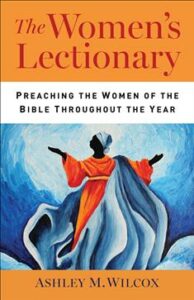 The Women’s Lectionary: Preaching the Women of the Bible Throughout the Year Ashely M. Wilcox (WJK) $40.00 OUR SALE PRICE = $32.00
The Women’s Lectionary: Preaching the Women of the Bible Throughout the Year Ashely M. Wilcox (WJK) $40.00 OUR SALE PRICE = $32.00
I’m not sure this Quaker (and graduate of Candler School of Theology and Willamette University School of Law) gets every story or pericope quite right. And she plays with the lectionary calendar a bit (it ain’t set in stone by God, ya know!)But, wow, to have an entire lectionary-based commentary on passages about women in the Bible (and feminine imagery of God) is a long-needed resource. Fairly mainstream Bible scholars (like the respected Luke Timothy Johnson) and teachers of preachers, (like Thomas Long) rave. As Emmy Kegler put it, it offers a “delicate balance of academic and wonder.”
She draws on solid, predictable, respected, sources such as Elizabeth Achtemeir, Katharine Door Sakenfeld, Gail O’Day, Wilda Gafney, Ray Vander Leeuwen, Gail Yee, Carol Meyers, Terence Fretheim, Pheme Perkins, Joel Green, Beverly Gavanta, N.T. Wright, Amy-Jill Levine, Juliana Claasens, Walt Brueggemann, and Renita Weems, just to name a few.
For those who might catch the reference, as a child she attended a Reformed Christian school and was a bone fide Calvinette.
ACADEMIC
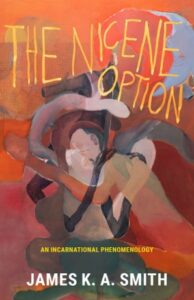 The Nicene Option: An Incarnational Phenomenology James K.A. Smith (Baylor University Press) $39.99 OUR SALE PRICE = $31.99
The Nicene Option: An Incarnational Phenomenology James K.A. Smith (Baylor University Press) $39.99 OUR SALE PRICE = $31.99
In recent years the brilliant Calvin University philosophy prof has become known for more popular level books such as Hearts & Minds favorites You Are What You Love and On the Road with Saint Augustine. We have crossed paths with Jamie in various locations and hosted him for a Hearts & Minds public lecture; his many books remain important to thoughtful Christian folks all over the world and to me personally.
This work, which I was proud to struggle through, is a collection of his very deep philosophical essays. Some were chapters previously published in major philosophy texts and some were in academic, peer-reviewed scholarly journals. Finally combined into one major text, this is Christian philosophy at its finest, looking, especially, at contemporary phenomenology and continental philosophy. I even did a bit of a review at BookNotes and thought that deserved some kind of year end award, maybe for audacity. I know enough to know I enjoyed this, mostly, and it is a must for philosophy majors, for those who want to dig deep into contemporary philosophy, and for fans who know the importance of reading Smith, on almost anything.
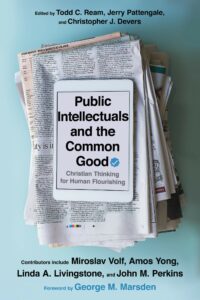 Public Intellectuals and the Common Good: Christian Thinking for Human Flourishing Todd Ream, Jerry Pattengale, Christopher Devers, with a foreword by George Marsden (IVP Academic) $25.00OUR SALE PRICE = $20.00
Public Intellectuals and the Common Good: Christian Thinking for Human Flourishing Todd Ream, Jerry Pattengale, Christopher Devers, with a foreword by George Marsden (IVP Academic) $25.00OUR SALE PRICE = $20.00
This is not a book that is overly academic, actually, but it is about the role of Christian scholars and how their work might “go public” and serve the culture at large. This emerged from an extraordinarily good edition of the usually rather studious and restrained scholarly journal, The Christian Scholars Review (Summer 2020) and has been released by the good folks at IVP Academic. I do not know who reads a book like this but I am deeply, deeply moved by this sort of work, calling for the very thing we idealistically imagined ourself somehow facilitating 40 years ago when we followed God’s call to open our shop and try to nurture a community of life-long learners wanting to make a difference in this hurting world. I nearly cry thinking of the possibilities of Christian scholars using their considerable gifts in this way, and the joy of a whole book about it. I applaud these curators, these collegiate dreamers, these nerdy scholars who know enough to know that their work really matters. Thanks be to God.
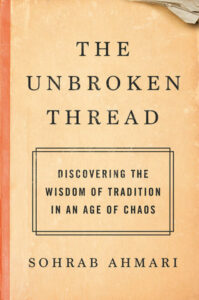 The Unbroken Threat: Discovering the Wisdom of Tradition in an Age of Chaos Sohrab Ahmari (Convergent) $27.00 OUR SALE PRICE = $21.60
The Unbroken Threat: Discovering the Wisdom of Tradition in an Age of Chaos Sohrab Ahmari (Convergent) $27.00 OUR SALE PRICE = $21.60
Again, this is not a full-on academic title nor is it on a scholarly/academic press. It is big and thick and erudite and about the history of ideas. And what a good bit of serious thinking it is.
I’ve recommended this in our BookNotes newsletter before, knowing it is a bit more rigorous than some of what we review. Here is how I briefly described it recently over at the new Jubilee Conference on-line bookstore site that we put together:
Sohrab Ahmari is a brilliant public intellectual, a stunning convert to Christian faith and a lively Roman Catholic apologist. (His own conversion narrative is told in his previous book, From Fire, by Water: My Journey to the Catholic Faith.) He writes columns for The Wall Street Journal and the New York Post but here he offers a compelling, scholarly discussion of the role of tradition, of what the role of conservation of older ways and values might be. The militant secularizing French Revolution, based on the secularizing rationalism of the Enlightenment, shaped modernity in a way that it is nearly in the air we breath, always considering “progress” a good thing, that we necessarily should move away from the old (or, better, mock it.) This book is a tour de force inviting us to resist such “newer is always better” assumptions and a critique of liberalism’s individualism — being a “self made” person. He charts a way to return to a wiser, deeper approach because, as Rabbi Meir Soloveichik puts it on the back cover, “we abandon the wisdom of the past at great peril to our future.” Learned, fascinating, provocative.
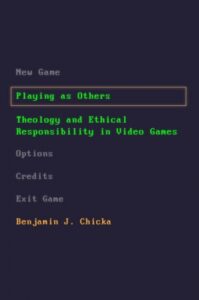 Playing As Others: Theology and Ethical Responsibility in Video Games Benjamin J. Chicka (Baylor University Press) $44.99 OUR SALE PRICE = $35.99
Playing As Others: Theology and Ethical Responsibility in Video Games Benjamin J. Chicka (Baylor University Press) $44.99 OUR SALE PRICE = $35.99
I have snuck in a few accolades here in our “Best Books of 2021” list, I’ll confess, not because I myself loved the book so very much but because, as a seasoned book-list watcher, reviewer, and intuitive second guesser, I discern that a certain book really is good, important, even. Even if I’ve only skimmed it. This is one of those times. So sue me.
Look: I know next to nothing about this topic so I’m on the lookout always for books that seem to bring bold and profound insights, ethics, at least, and a fresh way of thinking about the whole big thing. I am not alone in thinking that this exceptionally academic Christian university press is on to something here. Playing As Others is — I’m out on a limb here — a very good book. I dare you to read it and disagree.
Okay, maybe it is worth debating. Here is what we know: it “draws on the theology and ethics of Tillich and Levinas to explore how nontraditional video games can foster empathy and moral formation.” So there’s that.
Theology is capable of uncovering the depth dimension of culture — every aspect of culture, in principle. But video games? Yes indeed. Benjamin Chicka takes theology of culture a lot more seriously than most, and he shows how deep the culture of video games goes. Read this book to find out where ultimate concerns and ethical principles are explored in video games. Read to find out what Paul Tillich and Emmanuel Levinas have in common. This book will forcefully remind you that theology is profoundly connected to every aspect of our lives. Game on! — Wesley J. Wildman, Professor of Philosophy, Theology, and Ethics, Boston University School of Theology
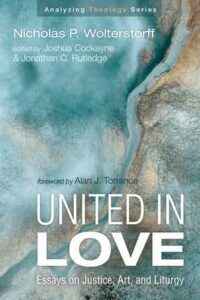 United in Love: Essays on Justice, Art, and Liturgy Nicholas Wolterstorff (Cascade Books) $34.00 OUR SALE PRICE = $27.20
United in Love: Essays on Justice, Art, and Liturgy Nicholas Wolterstorff (Cascade Books) $34.00 OUR SALE PRICE = $27.20
Deftly pulled together byJoshua Cockayne & Jonathan C. Rutledge and with a heady foreword by Alan Torrance, this volume is a fabulously rich introduction to three of the largest concerns — looming large for many of us, I’d say — of Christian philosopher Nic Wolterstorff. While this is a part of an ongoing “Analyzing Theology” series, and while Wolterstorff can do arcane, scholarly theology with the best of them, most of these essays are not in the field of theology, proper. He is working as a political philosopher and aesthetician and lover of worship. For what it’s worth, the excellent pieces in United in Love were gleaned from stand alone chapters Wolterstorff has offered for other anthologies — some of them from overseas publishers, or expensive volumes from Cambridge University Press or Yale University Press or, in some cases, rather obscure publishers. Having these solid works in one good volume is a major gift to the serious reading public and we rejoice.
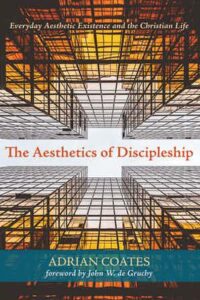 The Aesthetics of Discipleship: Everyday Aesthetic Existence and the Christian Life Adrian Coates (Pickwick) $31.00 OUR SALE PRICE = $24.80
The Aesthetics of Discipleship: Everyday Aesthetic Existence and the Christian Life Adrian Coates (Pickwick) $31.00 OUR SALE PRICE = $24.80
This is a very readable dissertation and it assumes that discipleship is embodied. “Formation in the Christian life is not an otherworldly exercise but one that plays in in this world, interwoven with everyday sensory experience in ordinary life.” You can see why I like it!
The Aesthetics of Discipleship is a bit philosophical, and it interacts with Kierkegaard’s framing of “aesthetic existence” and compares this with others who have written about the aesthetic dimension of life, from Bonhoeffer to Iain McGilchrist, Graham Ward to Nicholas Wolterstorff. (And, yes, he cites Calvin Seerveld’s Rainbows for the Fallen World. I would not honor it so if it did not.)
Does mature aesthetic awareness, anchored in love for God and an attentiveness to God’s creation, matter for a life of virtue, a life of discipleship? Does faith formation happen better when shaped by imagination? One heady academic who writes about this sort of thing says that Coates’s study is “engaging and ambitious.”The foreword by South African ethicist (and artist) John de Gruchy is fabulous; Coates, who has studied at Regent College in Vancouver, is himself South African. Naturally, Craig Bartholomew, a South African who studied with Calvin Seerveld loves it.
Listen to these rave reviews, although, remember — these are themselves academics, so their robust encouragement to read it might be leavened by a reminder that this is drawn from the authors PhD thesis and is quite scholarly.
We have, thankfully, an increasing number of books on embodiment from Christian thinkers. We now also have, finally, a book that recovers the importance of lived sensory experience for Christ’s call to discipleship. Coates brilliantly connects our shared human aesthetic existence to Christ-centered, incarnational living. I highly recommend this book for all readers interested in how to follow Christ, and therefore in the pursuit of true humanity. — Jens Zimmermann, Regent College, University of British Columbia
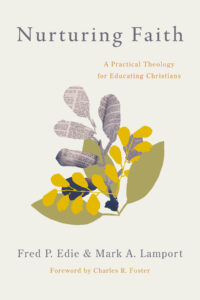 Nurturing Faith A Practical Theology for Educating Christians Fred P. Edie & Mark Lamport (Eerdmans) $44.99 OUR SALE PRICE = $35.99
Nurturing Faith A Practical Theology for Educating Christians Fred P. Edie & Mark Lamport (Eerdmans) $44.99 OUR SALE PRICE = $35.99
This is one of these major tomes that I have not read but just have to celebrate here – surely one of the most significant looking releases of this year in this category. Edie is a United Methodist pastor and veteran youth worker and an associate prof at Duke Divinity School. Lamport is a professor of practical theology who has written and published widelyon themes of formation and Christian education.
After this exceptionally current and quite comprehensive guide to CE ministries in the twenty-first century there are responses from Martin Percy, Almeda Wright, Craig Dykstra, Kiresetn Sonkyo Oh, Elizabeth DeGaynor and Thomas Groome. Wow. I’ve read these responses, first, because, well, that’s how I roll. Its pricey, but with endorsements from the likes of Will WIlimon, Justin Welby, Peter Phan, you know it is substantive.
Honest, inquisitive, theological, practical, comprehensive, and collaborative, Nurturing Faith is an essential primer for “all God’s fellow workers who tend God’s garden where he gifts and grows faith.— Ahmi Lee, Fuller Theological Seminary
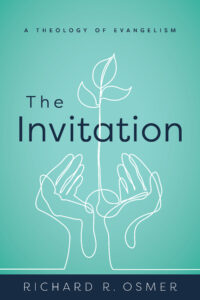 The Invitation: A Theology of Evangelism Richard Osmer (Eerdmans) $24.99 OUR SALE PRICE = $19.99
The Invitation: A Theology of Evangelism Richard Osmer (Eerdmans) $24.99 OUR SALE PRICE = $19.99
Jason Byassee says this is the “definitive book on evangelism today and likely for years to come.” I don’t know about that, but it at least deserves a good shout out here as one of the most important books this year. There is no doubt that it is rigorous — theologically and Biblically. As a long-time Presbyterian educator at Princeton Theological Seminary, Dick Osmer naturally has some issues with what we might call the “conversationist” approach and offers a “beautiful reimagining” of what we typically think evangelism is and is about. We are going to have to talk about this one, folks…
I kept thinking our friends at the Mercersburg Society would very likely appreciate this. If you get that reference, then you just might need this, too.
Osmer’s Bible study of evangelism in most of the New Testaments writers (and then a chapter putting them in conversation with Karl Barth) is so stimulating.
Throughout, we learn, that he holds to “the essential truth that it is Christ and the Holy Spirit who calls converts and makes disciples—not Christians. Thus, we can invite our neighbors to the wedding feast while remaining reassured that the table is already set.”
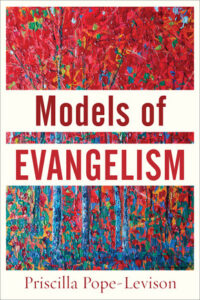 Models of Evangelism Priscilla Pope-Levison (Baker Academic) $21.99 OUR SALE PRICE = $17.59
Models of Evangelism Priscilla Pope-Levison (Baker Academic) $21.99 OUR SALE PRICE = $17.59
This is another book that I believe is well worthy of being listed, and should be studied and discussed. Some have called it a “landmark contribution to the literature on evangelism.”It basically looks at what she has developed as eight different models of doing evangelism. Wow. Of course, some in mainline churches (this author’s theological context) don’t do evangelism much, or have come to believe it is always pushy and odd. Not this woman! For others, I suppose, evangelism is just a simple thing and this may help bring needed nuanced, if not a righteous complexity. Many have raved about it, from Adam Hamilton to William Willimon who said it is “one of the decades best books on evangelism.”
Just consider:
The familiar faces of evangelism are hot, coercive mantras and cool, manipulative marketeering. Priscilla Pope-Levison will have none of that! Instead, she provides a rich, comprehensive taxonomy of the various spheres of evangelism, each of which reaches out in hospitable ways to different populations. This book will be for a long while the state-of-the-art articulation on this urgent subject. It is a welcome articulation! — Walter Brueggemann, Columbia Theological Seminary
This is a landmark contribution to the literature on evangelism. Steeped in detailed historical study, written with grace and wit, and informed by years of reflection, Pope-Levison’s book gives us a splendid overview of our options for evangelism. It is a total pleasure to recommend it without hesitation or qualification. — William J. Abraham, Southern Methodist University
After writing this little announcement, I learned that Outreach magazine name Models of Evangelism a 2021 Resource of the Year. Congrats.
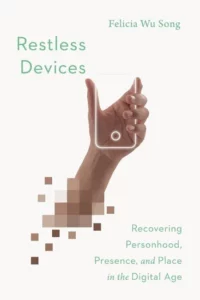 Restless Devices: Recovering Personhood, Presence, and Place in the Digital Age Felicia Wu Song (IVP Academic) $24.00 OUR SALE PRICE = $19.20
Restless Devices: Recovering Personhood, Presence, and Place in the Digital Age Felicia Wu Song (IVP Academic) $24.00 OUR SALE PRICE = $19.20
I have described elsewhere how this amazing, astute, scholarly work emerged from lectures given among the network of Christian Study Centers at universities around the country.
There are lots of good books that explore the social and cultural impact of digital media. There are lots about habits and practices in our own life as we navigate being disciples in this digital age. However, there are few books that bring together such serious socio-cultural analysis, important philosophical considerations about technology, vibrant faith and a hopeful Christian imagination as does Restless Devices. I really want to honor it as one of the more significant titles of this sort this year.
As one reviewer noted, “In our current digital ecologies, small behavior shifts are not enough to give us freedom. We need a sober and motivating vision of our prospects to help us imagine what kind of life we hope to live — and how we can get there.”
And isn’t that a huge, elephant in the room whenever we are setting ground rules about our use of technology — what kind of people are we becoming and what kind of people do we want to be?
Listen to these excellent recommendations. No wonder I celebrate it here, now, as a Best Book of 2021.
I have been looking for this book for years. Dr. Song brings the top scholarship and the deepest Christian reflection to bear on the important spiritual topic of how we faithfully engage our devices. In this digital age, which requires new forms of moral and spiritual reflection, there are few topics that could be more relevant or more needed. This is a book I will read again and again.— Elaine Ecklund, professor of sociology at Rice University and author of Why Science and Faith Need Each Other: Eight Shared Values That Move Us Beyond Fear
I have longed for a book like Restless Devices to be written. Felicia Wu Song compellingly examines the addictive qualities of digital media – its ubiquity and totalizing power. But her depth of expertise and profound Christian imagination allow her to go further than mere critique. She offers us practical hope in the ‘counter-liturgies’ of the Christian faith. I highly recommend this powerful work of spiritual formation to all who seek to live humanely and faithfully in our digital age — Tish Harrison Warren, Anglican priest and author of Liturgy of the Ordinary and Prayer in the Night
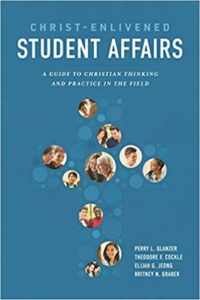 Christ-Enlivened Student Affairs: A Guide to Christian Thinking and Practice in the Field Perry L. Ganzer, Theodore F. Cockle, Elijah G. Jeong, Britney N. Graber (Abilene Christian University Press) $22.99 OUR SALE PRICE = $18.39
Christ-Enlivened Student Affairs: A Guide to Christian Thinking and Practice in the Field Perry L. Ganzer, Theodore F. Cockle, Elijah G. Jeong, Britney N. Graber (Abilene Christian University Press) $22.99 OUR SALE PRICE = $18.39
There are not many distinctively Christian, well-researched, principled, seriously professional books for those with the vocation of working in collegiate student affairs; indeed, friends of ours published what may have been the first evangelical contribution to the field (edited by David Guthrie, Students Affairs Reconsidered, and cited nicely here.) These authors bring that groundbreaking volume up to date, exploring theories and practices, faith and the calling into higher education, offering “a robust theological perspective for Christian student affairs.”
The book is animated by a love for God, a profound care for students and a passionate engagement with the best thinkers in the field. It includes a lively discussion of research from a national mixed-methods study.
MEMOIRS
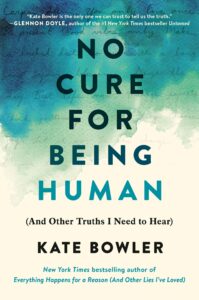 No Cure for Being Human (And Other Truths I Need to Hear) Kate Bowler (Random House) $27.00 OUR SALE PRICE = $21.60
No Cure for Being Human (And Other Truths I Need to Hear) Kate Bowler (Random House) $27.00 OUR SALE PRICE = $21.60
We have been big fans of this incredibly talented writer, her two well-known memoirs ofher life with her cancer, and her two works based on her fascinating academic research topic (one on Oxford University Press about prosperity preachers and another about the lives of women leaders in evangelical and charismatic megachurches.)
Not only was No Cure for Being Human one of my favorite memoirs this past year, it was one of my favorite books! Bowler’s great wit, heart-wrenching pathos, love for family and friends, her considerable sass, intelligence, faith — deep, but not cliched or fundamentalist — made for great reading; many times I’d just set the book down, sigh, exclaiming how darn good the line or phrase was. The joy of reading her word-smithing line by line aside, it is a page-turning story of her ongoing coping with cancer. I loved the earlier Everything Happens for a Reason (And Other Lies I Needed to Believe) and this is even 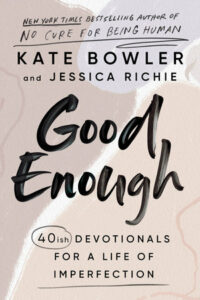 better. Surely a book of the year
better. Surely a book of the year
We’re excited, by the way, that her brand new daily devotional (Good Enough) is just now out. Good Enough: 40ish Devotionals for a Life of Imperfection Kate Bowler with Jessica Richie (Convergent) $21.00 OUR SALE PRICE = $16.80
I was thrilled, by the way, to see the name of our friend Cole Arthur Riley, whose amazing new book This Here Flesh just released a few days ago, in an endorsing blurb, right there on the back cover, right by Barbara Brown Taylor. I know that is happening in real time, this week, in 2022, but this is worth a shout out now:
“With humor and wit, Good Enough guides us into a spirituality that is at once rich and humble, challenging us to search for beauty and meaning in deep waters, yet never asking more of us than a tender and compassionate God would. This devotional is medicine for all those thirsting for mercy in the mundane.”—Cole Arthur Riley, author of This Here Flesh and creator of Black Liturgies
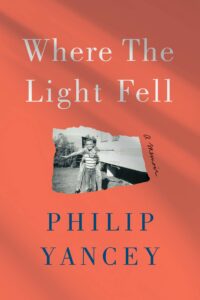 Where the Light Fell: A Memoir Philip Yancey (Convergent) $28.00 OUR SALE PRICE = $22.40
Where the Light Fell: A Memoir Philip Yancey (Convergent) $28.00 OUR SALE PRICE = $22.40
I have read many books by Phil Yancey, watched videos, did author events watching him sign books, and done classes on his work. I’m a fan, and highly recommend his thoughtful, eloquent, but clear and accesible prose to all. This is his long-awaited memoir about his toxic, racist, home church, his tough childhood, his faith journey, his troubled brother, and more. I rejoice that he is still a gentle Christian, a sharp evangelical, a reliable Christian witness. Now we know a bit about why he is over and over drawn to themes of suffering and themes of grace.
Raw, honest, beautifully written, and at times searing . . . We live in a world that is always clouded by ungrace, by strife and anger and division, according to Yancey, and Christians should be on the other side . . . The pain of [Yancey’s] early life gives his words and his witness an authority and authenticity that he would otherwise not have. He has become, over time, a person to whom the wounded and the brokenhearted are drawn, compelled by his message of grace. — The Atlantic
Where the Light Fell is in many ways a classic spiritual autobiography tracing one man’s conversion from cynic to believer. But it’s more. It’s a searing family story as revelatory as gothic Southern fiction. It’s an exposé. It’s a social critique. It’s a tragedy. It’s a tale of redemption. . . . The memoir itself is an answer to the question that looms throughout: What do we do with the burdens, sins, and pain of our past?” — Christianity Today
Philip Yancey is not just one of my favorite Christian writers, but one of my favorite writers, period. He is fearless in addressing the toughest questions and hardest times, the crucifixions we will all know during this life, the hope and shapes and colors of resurrection. — Anne Lamott, bestselling author of Dusk Night Dawn
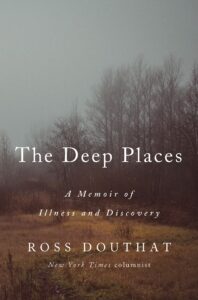 The Deep Places: A Memoir of Illness and Discovery Ross Douthat (Convergent Books) $26.00 OUR SALE PRICE = $20.80
The Deep Places: A Memoir of Illness and Discovery Ross Douthat (Convergent Books) $26.00 OUR SALE PRICE = $20.80
I think that my longer review at BookNotes is worth reading —I couldn’t put this vulnerable book down and couldn’t stop talking about it — but the short version might go like this:
For the many who have been made seriously ill by Lyme or other tick-born diseases, we know well the painful disorientation, the desperation, even, for a cure, or at least for a doctor who believes us, who understands. This eloquent and sophisticated writer — a fairly conservative columnist for The New York Times and a devout Roman Catholic — was laid low by a mysterious illness which ended up being chronic Lyme. He was not prepared for how this lead him to underground networks and odd associations, searching for healing insight, for help. He writes that a year earlier he wouldn’t possibly have imagined himself being with people who were also conspiracy theorists, even weird and troubling, but there he was. They shared a common passion to get better, no matter what.
The Deep Places is truly an exceptional memoir, fascinating and informative, about illness, but much more than that. It tells about being a young man at the top of his career with a wife and kids, buying a home, and coping with unbearable chronic pain. Finally, though, it is a question of who to believe, how we know what is best (how do we really know anything?) what is true, especially regarding medical mysteries. I find myself wanting to shout about this from the rooftop as it is so very important, even in these Covid days… and so moving. The Deep Places is wise and caring and intersting and very important for any and all of us. Anybody who has had Lyme will understand! Very highly recommended.
Read these comments about the wonder and value of this book, please:
Douthat artfully weaves two stories together. The first is the story of his own illness, the increasingly outlandish treatments he is willing to try, and the havoc the affliction wreaks in his life. As he looks for a cure, he uncovers a second story: the strange tale of Lyme disease itself . . . No two chronic illnesses are exactly alike, but even so this book will likely resonate with anyone who has suffered from a chronic condition or has cared for someone who has. — Paul W. Gleason, LA Review of Books
To call it a memoir about illness is to seriously underestimate this beautiful new book. Douthat brings a believer’s heart, a journalist’s curiosity, and a writer’s talent to tell an achingly human story that is, ultimately, about life. — James Martin, SJ, bestselling author of Learning to Pray
I read the book in one sitting. It is so profound and truthful about the human condition. I wanted it to go on and on. I had no idea that Douthat was such a poet of pain and hope. — Rod Dreher, bestselling author of Live Not by Lies and The Benedict Option
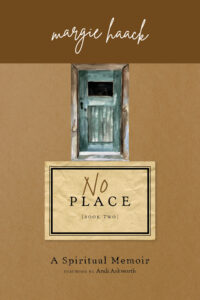 No Place: A Spiritual Memoir Margie Haack (Square Halo Books) $24.99 OUR SALE PRICE = $19.99
No Place: A Spiritual Memoir Margie Haack (Square Halo Books) $24.99 OUR SALE PRICE = $19.99
Happily, this has been one of our big sellers this year — we so appreciate the Ransom Fellowship support that Margie and her husband Denis have given us over the years, and they’ve sent many of their devout fans our way. As we’ve said in two fairly long BookNotes reviews, this is a remarkable memoir of the early marriage of Margie and Denis, their slow move away from a legalistic and toxic sort of fundamentalism even as they deepened in their honest desire to serve Christ and his Kingdom, finding their way to a more honest and culturally engaged faith style. And what did cultural relevance look like in the very early 70s? They were part of a counter-cultural Jesus-people community in New Mexico offering hospitality and gospel care to hippies of all sorts, from druggies to revolutionaries to occultists. That they were on the cutting edge of contextual mission in those days is putting it mildly. (And, how did this idealist sort of work effect their marriage? Their ability to find work in a more conventional church, later? Did it put them on a path towards their later life ministry? My, my, what a story this is. What a life they’ve lived.)
No Place is a splendid memoir of a new marriage, the high octane cocktail of religion and counter-cultural life of the late 60s and beyond; it stands on its own merits as a fine sequel to Margie’s excellent girlhood memoir The Exact Place. Yet, we have suggested that this great book is more than just an entertaining story, a literary memoir that tells of some interesting times that you will enjoy. It is, in many ways, a parable of life and times, of faith and life, of radical discipleship, of a search for meaning and purpose and, yes, home. I think you will be a 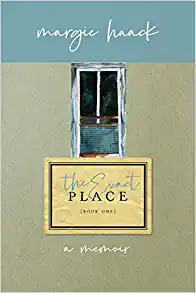 God who is faithful as you read it.
God who is faithful as you read it.
By the way, as we have noted, her earlier The Exact Place has just been reissued in a newly edited version from Square Halo Books with some new content and a brand new (matching) cover. Volume Three of the set, which was once called God in the Sink: Notes from Toad Hall has new material, too, and has just been reissued as This Place.
No Place (the middle one) is the one 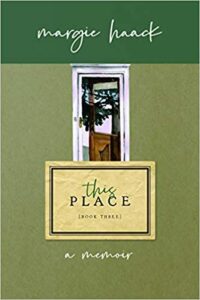 that released in 2021; the new Square Halo editions of the older first and third ones are just now out in February 2022. Buy all three in their new matching editions — The Exact Place, No Place, and ThIs Place. In cany case, don’t miss going on their early 70s journey to no place, where they find a real place. No Place is one of my favorite reads of 2021. All three are 20% off.
that released in 2021; the new Square Halo editions of the older first and third ones are just now out in February 2022. Buy all three in their new matching editions — The Exact Place, No Place, and ThIs Place. In cany case, don’t miss going on their early 70s journey to no place, where they find a real place. No Place is one of my favorite reads of 2021. All three are 20% off.
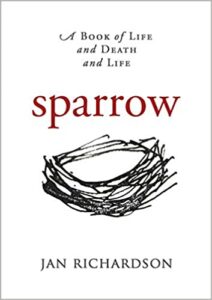 Sparrow: A Book of Life and Death and Life Jan Richardson (Wanton Gospeller Press) $24.00 OUR SALE PRICE = $19.20
Sparrow: A Book of Life and Death and Life Jan Richardson (Wanton Gospeller Press) $24.00 OUR SALE PRICE = $19.20
Oh my, I can hardly say in plain words why this elegant book deserves to be on any list of best books of recent years. It is a memoir of loss, the artistic, spiritually-deep author writing well about her husband’s death, and more. This is a beautifully made hardback book and poetically written, as you would expect from poet, writer of prayers and blessings and liturgies and devotions. Sparrow is a book that feels holy to hold, about enduring love and grace. It is the memoir that perhaps could be seen as the backstory of the moving prayer-poems in A Cure for Sorry which we also stock.
Here is how it is describes by her publishing venture:
“Who am I, when the person who saw and knew me best in all the world is gone from this world?” Jan Richardson’s question lies at the heart of Sparrow, a book that began as notes written to her husband, the singer/songwriter Garrison Doles, while keeping vigil for him in the hospital after a disastrous surgery just a few years into their marriage.
Six months after Garrison’s death, Jan returned to those notes and began to write again. The pages grew into an unexpected conversation as she worked to make a new life. Here, Jan invites us into that conversation. She resists simple answers for deepest sorrow, entering instead into the raw complexities of grief, which she calls “the least linear thing I know.”
In Jan’s distinctive spare and elegant style, Sparrow traces a path through the first few years after her loss, articulating not only the ache of grief but also the strange graces and stubborn hope that live within its landscape.
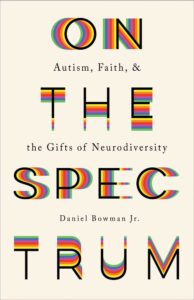 On the Spectrum: Autism, Faith, and the Gifts of Neurodiversity Daniel Bowman (Brazos Press) $19.99 OUR SALE PRICE = $15.99
On the Spectrum: Autism, Faith, and the Gifts of Neurodiversity Daniel Bowman (Brazos Press) $19.99 OUR SALE PRICE = $15.99
I hope you recall my rave review of this at BookNotes last summer. Daniel Bowman is a beloved professor at Taylor University and a thoughtful Christian scholar of literature, a writer and poet. In this exceptionally moving story he tells of his own experience of neurodiversity and what it is like to be an adult Christian leader who is on the autism spectrum.
Interestingly, there are many books about being autistic and many are not written by persons with autism. Here he remedies that by telling of his own struggles, his theological considerations about the gifts of neurodiversity, and how we might all learn from one another. This is a great read, good for all of us, and one of my favorite books of last year.
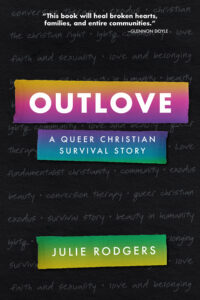 Outlove: A Queer Christian Survival Story Julie Rodgers (Broadleaf Books) $24.99 OUR SALE PRICE = $19.99
Outlove: A Queer Christian Survival Story Julie Rodgers (Broadleaf Books) $24.99 OUR SALE PRICE = $19.99
I have written about only a few of the many books I’ve read about the experience of LGBTQ Christians, learning from their stories, their anguish, their joys and sorrows. In talks about reading widely I often mention the gifts of empathy and care we can develop as readers when we “walk a mile” in another’s shoes. I have been criticized for this scope of reading and yet resolve to hold up stories of people many of our customers may not be inclined to consider.
This memoir of Bible believing, evangelical Julie Rodgers is illuminating for a variety of reasons. The short version would say how she was a poster child for one of the ministries that tries to “pray the gay away” and that she often went on the road with a male leader of such a ministry, learning to give her testimony and share with others about God’s eagerness to change their same-sex attractions. It is a poignant glimpse into conservative, evangelical para-church ministries, her caring home life, her home church and her own coming of age as a young evangelical leader. The problem was — most of this simply wasn’t true, and the story became one of her coming out her leaders, slowly realizing that she was not who they wanted her to be. In a remarkable part of the story, they wanted her to just keep on telling the tale, essentially asking her to deceive others about her own life and about the promises she was making. When she finally couldn’t keep up the charade, this mentor who had professed spiritual care for her dropped her. It is a terrible part of the story.
Those who have studied the demise of Exodus and other such ministries know well that hardly no one had the sort of transforming change they alleged to have had and few were fully honest about their desires and interior lives since they didn’t fit the narrative.
The next part of Rodger’s journey was as an out gay Christian but one committed to celibacy; there are others who have written powerfully about this faithful option — I think of Wes Hill and his Washed and Waiting, say, or the nicely written books by Greg Cole — and in this new sort role as a new sort of spokesperson, Julie was hired by a well known evangelical college, perhaps the first such out gay follower of Christ to take up a position in any such college. She started doing Bible studies and providing safe fellowship spaces for LGTBQ students, many who were holding on to their faith by a thread, some who were deeply distrustful of evangelical faith. She thought was being supported by the college but as she tells it that was not the case. I won’t offer a “spoiler” but it is a dramatic story, full of anguish and betrayal and institutional politics that should embarrass the college leadership. The book tells of loss and change and renewed sorts of faith.
I found this to be another memoir that I was very deeply moved by, a story that needs to be heard, learning how some of our brothers and sisters, sons and daughters, experience their faith as those with same sex attractions. Memoirs are a real gift, a window into how others constue their lives and tell their stories. Agree or not it, it is their own story to tell, and therein lies the great gift.
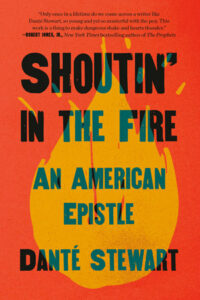 Shoutin’ in the Fire: An American Epistle Dante Stewart (Convergent) $25.00 OUR SALE PRICE = $20.00
Shoutin’ in the Fire: An American Epistle Dante Stewart (Convergent) $25.00 OUR SALE PRICE = $20.00
After reading some of this a second time I am even more sure I want to honor it as one of the best books of 2021. Here is some of what I wrote about it last fall:
When people we know and respect so highly promote a new author, we notice. For instance, Calvin University scholar and popular historian Kristin Kobes Du Mez says:
“A magnificent debut. . . If you read one book this year, make it this one.”
Robert Jones, Jr., himself a New York Times bestselling novelist (author of The Prophets), says:
Only once in a lifetime do we come across a writer like Danté Stewart, so young and yet so masterful with the pen. This work is a thing to make dungeons shake and hearts thunder.
The advanced recommendations and rave endorsements kept coming in, from Krista Tippett, Rev. Jacqui Lewis, Imani Perry, Kiese Laymon, Bishop William Barber, Jonathan Wilson-Hartgrove, even the Pittsburgh-based fiction writer Deesha Philyaw. The praise has been shoutin’.
In a way, this book stands among many memoirs naming the complexity of the black experience in white America. Tisby is right — the prose is arresting, the meditations emotional, the insights revealing. One reviewer said Shoutin’ in the Fire is written with “unparalleled candor” which, while perhaps not technically accurate, does illustrate that his is one of the voices in the movement of black authors being real; really real, telling it like it is as we used to say. (This candid truth-telling by black writers is not new, of course, but it does feel particularly frank and fresh, given Stewart’s role within the church and how that is part of his story of “groan and ache.” If you have appreciated the highly-regarded memoir I’m Still Here: Black Dignity in a World Made for Whiteness by Austin Channing Brown (the same publisher, the same shape of trim-sized hardback) Shoutin’ in the Fire should be on your list. It is a book you will find it hard to put down.
I needn’t say much more other than to say that we feel privileged to get to recommend and to sell such important books by black authors of this calibre. Young Mr. Stewart is a very good writer — you can tell from the very first pages — and he is rooted well in a black family in the black community in the black church.
He knows whose shoulders he stands on, too — he cites before each biographical chapter a good epigram, authors like James Baldwin (there’s that fire language, eh?) And bell hooks, Gwendolyn Brooks, Toni Morrison, Audre Lorde, Nikki Giovanni, Ta-Nehisi Coates. And Maya Angelou, of course. And, happily, near the end, rapper Kendrick Lamar. So Danté is a lover of language, nearly a rural poet himself, coming up in Calhoun County, South Carolina. His BA degree was in sociology from Clemson (where he also played football) and he’s currently studying theology at Candler School of Theology in Atlanta. As a writer and speaker, he is one young leader to watch. We all need, as Stewart puts, it in a closing note to Baldwin, “praise breaks and prophetic lines: We shoutin’ in the fire.”
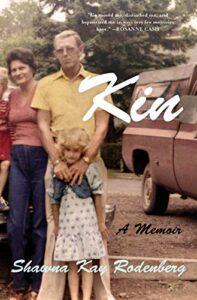 Kin: A Memoir Shawna Kay Rodenberg (Bloomsbury) $28.00 OUR SALE PRICE = $22.40
Kin: A Memoir Shawna Kay Rodenberg (Bloomsbury) $28.00 OUR SALE PRICE = $22.40
We are told that “This startling memoir of a wild soul will electrify you. The unbreakable Shawna Kay rises again and again to forgive, despite every institution that failed her.”
And, yep, that was true.
Or, this, from Rosanne Cash: “Kin moved me, disturbed me, and hypnotized me in a way very few memoirs have.”
I know Ms Cash is especially literate and has endorsed another memoir or two that were remarkable. She, like many of the other reviewers, have noted that this story is written as “an intimate portrait of hardscrabble life in a much-derided, little understood place.” Michael Patrick Smith (author himself of The Good Hand) continues:
With the grit of the damaged yet hopeful, Rodenberg crafts the raw notes of faith, addiction, and generational trauma into a hymn to survival. By focusing on the deeply personal lived experience of a family, Kin contains worlds.
Indeed, it “contains worlds.” Like other memoirs of abuse and complications of family and place, you may not exactly imagine yourself there, and yet, yet, you relate. There are universal themes here, including a love of place, shame about poverty, relationships that are toxic, religion, faith, spirituality, education, culture, and adult children loving their parents despite the often horrible mistakes. And — oh, my — forgiveness.Who wouldn’t benefit, or at least be stimulated if not inspired, by looking over the shoulder at one truly memorably family coping with so much grit and grace?”
Here’s the deal with this complicated, well-written story. First, you should know that Shawn had a very hard upbringing with hard-scrapple extended family in small towns among the mountains of Appalachia. She is now a somewhat sophisticated, college literature professor in another State and the book opens as she is serving as a liaison to the local folk in the holler with a big city TV crew doing some kind of documentary. The New Yorkers disdain for the local people (and their crass stereotypes, asking her to help them find shots that simulated the hillbilly optics they wanted) is exceedingly annoying and Shawna Kay’s keen capacity to relate to two different worlds is obvious. I do not make comparisons of the people or even the books, but because many readers will get the reference, I suggest that she is, in some ways, like Tara Westover of Educated and J.D. Vance of Hillbilly Elegy and, more recently — in some surprising ways — perhaps even Philip Yancey of Where the Light Fell.
Yancey describing growing up with a faith that was harsher than most, “much worse.”
Kin narrates a story that was “much worse.” And not only worse, but much more weird.
You see, Shawna Kay Roderberg (who tells her story with “near heroic self-awareness and insight,” as one reviewer put it) was raised on-again, off-again, in a very strict fundamentalist cult in Minnesota. Maybe not a cult, but at least an expression of exceptional Pentecostalism and hyper-fundamentalism that drew her parents to live in a sectarian community, off the grid, prepping for the end times. She was raised — at least during her time in the fellowship — on a rural compound, eating meals in what sounds like a church camp setting, living in cottages that are meagerly appointed and hardly heated. This in the late 1970s and 80s, with parents who renounced the world and forbade their children most toys and books and most contact with the outside world. How her parents got into this heavy Bible teaching of Reverend Sam Fife is another part of the story and the ways she both appreciated and hated the rules of the place are fascinating. (To say Shawna is precocious is quite the understatement!)
I award this as one of the best books of 2021, without a doubt. It is playful and funny at times, horrible and horrific at others. The fellowship believed in corporal punishment, of course, and there are some scenes of harsh abuse (and other bizarre stuff that seems almost expected in these kind of highly authoritarian religious sects.) Even when they move away (backsliding, as they might call it) they connect yearly with others in this network at larger gatherings.
I hope I’m not saying too much when I hint that her parents themselves have an epiphany or two about the heavy-handed and anti-worldly fellowship. They get a job serving the movement away from the intentional community and, on some days, allow a more normal lifestyle. Their faith wavers, they fall away, they move back to Appalachia.
And we thought the people in the Minnesota sect were toxic and odd. Well, man, this story is just heating up.
Shawna, knowing little about 1980s junior and senior high fashion, let alone popular culture, enters her school in Eastern Kentucky.
Shawna was permitted and has nearly memorized from repeated re-readings the Little House on the Prairie books and the way those stories keep coming up is a fun device. It is a part of her childhood that she clings to even as she gets older. The narration of her years in school back in small town Kentucky — learning how more ordinary rural kids live in public schools, enjoying time at DQ and Pizza Hut and going to the Dollar Store and school events and attending more ordinary country churches — is striking. How little she knows about school life, popular culture, attire, even. Not to mention, shall we say, sex, drugs and rock and roll. But she is a fast learner. So there’s that.
To make matters worse, although it is not explored in detail, there are hints of PTSD from her father’s Viet Nam war service. Which perhaps explains some things…
This family is troubled, and various branches of their relatives have their strengths and weaknesses. It will keep you turning the pages, I promise. Rodenberg both makes Appalachian life and near poverty vivid and compelling but her story dispels many stereotypes (even as it might reinforce others.) Her angle of vision and the tone of the book is decidedly not Hillbilly Elegy. I love the blurb on the back of Kin, that says, “Whatever you believe about Appalachia, prepare to have those beliefs upended, or at least beautifully complicated.”
Beautifully complicated. That’s it! Kin and my feelings about why I loved it so are beautifully complicated.
This recent book, a personal favorite this year, is a high-octane memoir full of vivid descriptions, colorful stories (and colorful language) telling of the struggles of deep faith, distorted as it may be, family love and dysfunction, violence and harm and goodness and redemption. Can telling a story like this itself be an act of hope, what too many reviewers too casually call redemption? I think so. In that sense the above-quoted writer who said this is “secular Scripture” is wrong. It is not Scripture, of course, but it is not utterly secular either. This is a story of some sort of amazing grace and through the ups and downs, extravagant weirdness, family mental illness and unreliable choices, the story shines.
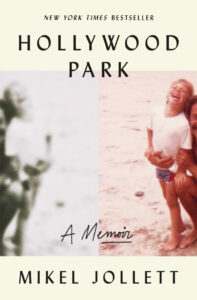 Hollywood Park: A Memoir Mikel Jollett (Celadon Books) $27.99 OUR SALE PRICE = $22.39
Hollywood Park: A Memoir Mikel Jollett (Celadon Books) $27.99 OUR SALE PRICE = $22.39
Okay, I will admit I am on a roll here, recalling the most vivid prose, the most creative writing, the most breath-taking stories of 2021. (See my November 2021 list of memoirs for some others that I read last year, but did not come out in 2021, like the stunner by Carolyn Forche or the investigative story Soul Full of Coal Dust.) This one, though, this one, was a book I will never forget. Beth says that, too, as we both turned pages and pages late into the night, first me and then her. We both were heartbroken and perplexed, entertained and moved.
I want very much to talk about this, but I know I have written more than many can hardly endure. I am sorry — these are some of my favorite books and I want to describe them in a way that is enticing but honest. Some may not find them suitable, and I understand. And this is one, too, with some pretty harsh language and some pretty rough stuff.
I have liked Mikel Jollett as a free lance writer, a guest on NPR, a rock music critic, but mostly as front man for the alt-rock band Airborne Toxic Event. (Anybody who names their band after a line from a Don DeLillo novel is pretty cool if you ask me. This is not gospel music, mind you, so don’t misunderstand. If you are interested, I especially appreciate their second studio album, 2011s All At Once.)
This very complicated and incredibly well-written memoir tells of Jollett’s life growing up (as a very young child) after his mother and father snuck him out of the drug-treatment center turned oppressive cult, Synanon. The place was corrupt, evil, even, and the book explores — after years of family weirdness and break up and a very dysfunctional mother and an addicted turned good guy dad and horrific treatment on many fronts — Jollett’s attachment disorder and damage done having grown up in a communal setting without connections to parents or siblings. The story unfolds with increasing awareness of the horror of the cult, and Jollett finds solace, finally, in song writing and going on the road as a performer. His passionate writing about being on stage is some of the best rock and roll writing I’ve ever read.
The new millennium post punk scene was fascinating; the drug stuff (among teens!) was shocking to me; the narcism of the mother was among the most tragic bad parenting I’ve ever read about… and yet, Mikel loved her, cared for her, as he had too, really. Eventally, Jollett grows as a writer, grows as a musician, and, well, he tells an amazing story about struggles and longing and loss and some sort of redemption. The Hollywood Park in the title of the book alludes to an old LA-area horse race track and figures in as a place he and his dad would. There is a scene near the end that, well… get the Kleenex out is all I’m saying. This is one of the most fascinating memoirs I have ever read, a book I think I will never forget.
BEST BIOGRAPHY (of C.S. Lewis)
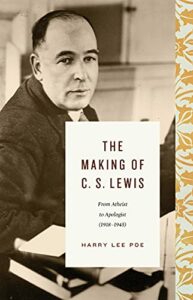 The Making of C.S. Lewis: From Atheist to Apologist (1918- 1945) Harry Lee Poe (Crossway) $32.99 OUR SALE PRICE = $26.39
The Making of C.S. Lewis: From Atheist to Apologist (1918- 1945) Harry Lee Poe (Crossway) $32.99 OUR SALE PRICE = $26.39
Okay, I didn’t want to be overly pompous declaring this the best biography of the year. I have not read that many biographies (and even though we named the Robert E. Lee bio by Guelzo last week in Part One of this list of favs, I had the good sense to list that under “history.”) Best biography? That’s above my pay grade.
But I am quite confident that this second volume in what I gather will be a trilogy is, without a doubt, the best biography of Lewis in many a year. Alan Jacob’s wonderful The Narnian and Alister McGrath’s C.S. Lewis: A Life – Eccentric Genius, Reluctant Prophet are contemporary standouts, but this, being a multi-volume set, certainly is able to explore deeply. It’s begin touted as one of the 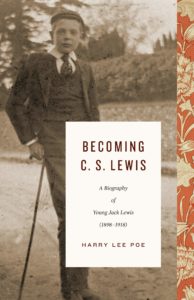 best.
best.
The first volume, on Lewis’s boyhood (Becoming C.S. Lewis) is said to be the best work on the subject to date. This one proceeds, without sentimentality or breathy prose, where the first one left off, in 1918 as Jack is convalescing from the famous and painful shoulder wound because of which he was evacuated from France. Poe plainly reminds us that the shrapnel remained in him, troubling him for years, as did the headaches and night terrors. “His wound,” Poe notes, “may have inspired the shoulder wound of Frodo Baggins when J.R.R. Tolkien wrote Lord of the Rings.”
This, then, follows his coming of age during the great war, as he returns to Oxford, his love of literature, his poetry. Of course his friendships with Tolkien and the other Inklings and his slow conversion to Christ. Most know that what became Mere Christianity were firstly aired on the BBC as radio talks. Many know about his friendship with Tolkien, Dorothy Sayers, and other Inklings. Some may know about brother Warnie and Mrs. Moore, Addison’s Walk and the Kilns. But there is so much detail, clearly told. It is, as Lewis scholar Colin Duriez puts it, “refreshingly accessible as well as deeply knowledgeable.”
Kudos to Crossway for a lovely design, the black and white photos so sticking as endpapers and the textured dust jacket. In every respect, this deserves to be considered one of the best books of 2021
FAVORITE NOVEL
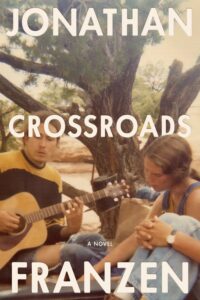 Crossroads: A Novel Jonathan Franzen (Farrar Straus & Giroux) $30.00 OUR SALE PRICE = $24.00
Crossroads: A Novel Jonathan Franzen (Farrar Straus & Giroux) $30.00 OUR SALE PRICE = $24.00
I have held up this whole newsletter, this award sheet, this ramble of a year’s worth of some of my favorite books, or books I think are important, or need to be honored here, just because I wasn’t sure I wanted to write about this. To pick a novel is hard; really hard. Beth couldn’t even begin — she served this year on a judges panel for an ECPA award for fiction, and she has really enjoyed so many this year. (And they sent her the books for free! Yay!)
IfI had to pick a work of fiction that has stood out for me, that I lost myself in, that was worth every penny of entertainment dollar spent, it is clear which I would say. Without a doubt, my favorite novel this year was this much-discussed, very surprising, very contemporary bit of serious fiction, Crossroad by the famously talented Jonathan Franzen.
Some do not like Franzen; he is too hip, too cool, maybe, too much of a symbol of new millennium novelists, so full of artful detail and yet social commentary. I don’t know about that, I just know some love him and some hate him. I really, really liked The Corrections and Freedom. And I was captivated by Crossroads, every one of the 580 pages. (Well, except that last page; I’ve got issues with that.)
I really hate to spoil the fun — I didn’t know a thing going in to it — but I suppose you could know this much. It is about (get this!) a liberal, mainline church (maybe UCC, although it is called “First Reformed”) and their youth ministry, a hang-out place full of psycho-babble and group authenticity, set (before the considerable flashbacks) in 1971. There are urban ministry trips (maybe well intended, although sometimes not, suburban white folks going to the ghetto) and there is an epic youth mission trip to a Native reservation. There are prayer services and church staff meetings and some college-age folk singers who are maybe going to make it big, (but they have their principles, man, you know?) They debate the war, in more ways than one. There is professional jealousy, all sorts of theological stuff (including a smart teen of a mainline pastor who finds herself born again at a neighborhood Baptist church and critiques her father’s vapid sermons and boringly goofy theology.) So, so much of this rang true (yes, the youth ministry place was called Crossroads) and much of it just astonished me.
This is a very contemporary novel, haunted by God, but not at all what some might call a “Christian novel.” Again, I am astonished at how very much faith and theology and heart there is in this story set in the troubled family of a mainline clergy-person. How did Franzen learn about this stuff? How does he get so much right (and some things that seemed not quite right for early 70s church life.)
I will also say this: I am not sure what it means to say a book is postmodern but it is very knowingly self-aware about the interior lives of the characters, all of them, and there is more fear and doubt and guilt and shame and sex and drugs that you can imagine in book about religious people. So, as with some of the memoirs named above, this is not for those unwilling to engage the mores of modern fiction and the ethos of, of, of, whatever is going on here. Does it offer glimpses of gospel? Does it revel in showing the crummy humanity of even the religious? Does it understand grace, despite all the talk of it? Is it all ironic? Is he a Christian? I can ‘t say. But it was a heckuva a story, a sprawling epic of unhappiness and church and justice and love. Even the Kirkus Review says it had moments that were “uplifting” and declared that it was, “in a word, exquisite.”
It is said that Mr. Franzen has two more in the saga of these 1970s Hildebrandt’s. I can’t wait.
TO PLACE AN ORDER
PLEASE READ THESE SIMPLE REMINDERS AND THEN CLICK ON THE “ORDER” LINK BELOW.
It is helpful if you would tell us how you prefer us to ship your orders. The weight and destination of your package varies but you can use this as a thumbnail, general guide.
There are generally two kinds of US Mail options, and, of course, UPS. If necessary, we can do overnight and other expedited methods, too. Just ask.
- United States Postal Service has the option called “Media Mail” which is cheapest but slow and may be delayed. For one book, usually, it’s about $3.50 – $4.00
- United States Postal Service has another option called “Priority Mail” which is about $8.35 if it fits in a flat rate envelope. Many children’s books are oversized so that will take the next size up with is $8.95. That gets much more attention than does “Media Mail.”
- UPS Ground is reliable but varies by weight and distance and may take longer than USPS. We’re happy to figure out your options for you once we know what you want.
– DON’T FORGET TO LET US KNOW WHAT SHIPPING METHOD YOU PREFER –
HELPFUL HINT: If you want US Mail, please say which sort — Media Mail or Priority Mail — so we know how to serve you best. If you say USPS or “regular” we’re left scratching our noggins.
BookNotes
SPECIAL
DISCOUNT
20% OFF
ALL BOOKS MENTIONED
+++
order here
this takes you to the secure Hearts & Minds order form page
just tell us what you want to order
inquire here
if you have questions or need more information
just ask us what you want to know
Hearts & Minds 234 East Main Street Dallastown PA 17313
read@heartsandmindsbooks.com
717-246-3333
We are still closed for in-store browsing due to our commitment to public health and the common good (not to mention the safety of our staff and customers.) The vaccination rate here in York County is sadly lower than average and the hospitals are overcrowded. Our store is a bit cramped without top-notch ventilation so we are trying to be wise and faithful. Please, wherever you are, do your best to stop this awful sickness going around.
We are doing our famous curb-side customer service and can show any number of items to you if you call us from our back parking lot. We are eager to serve and grateful for your patience as we all work to mitigate the pandemic.
Of course, we’re happy to ship books anywhere. Just tell us how you want them sent.
We are here 10:00 – 6:00 EST / Monday – Saturday, closed on Sunday.

